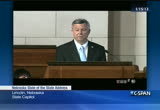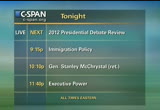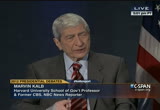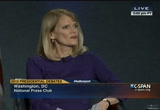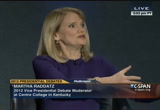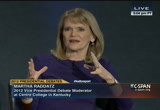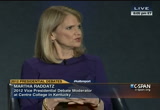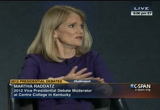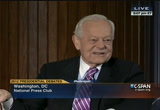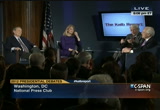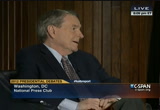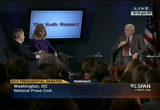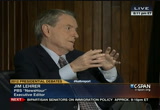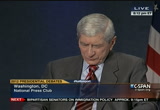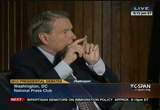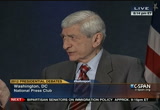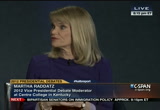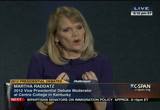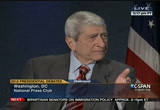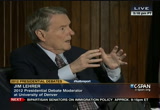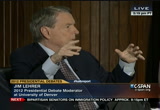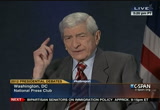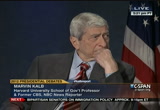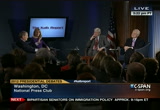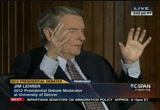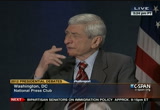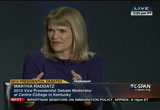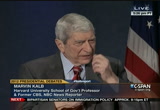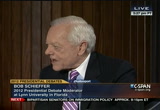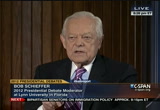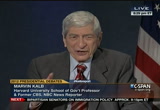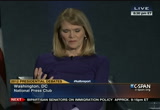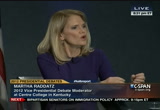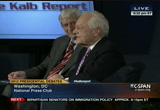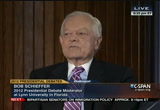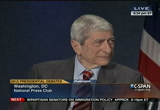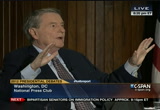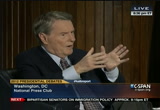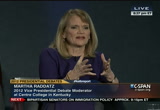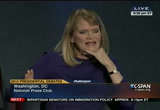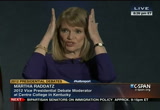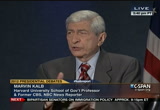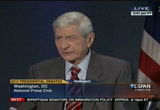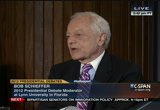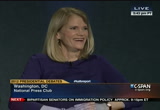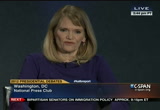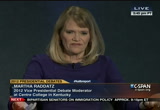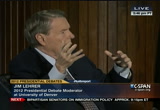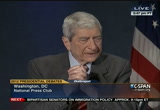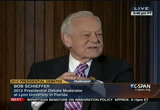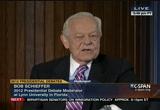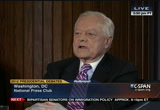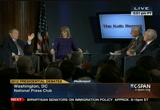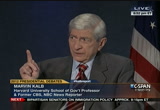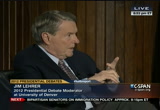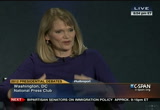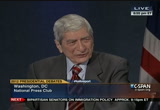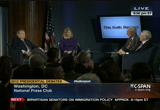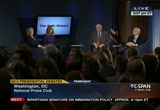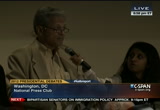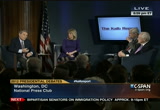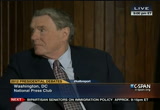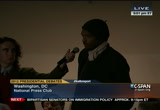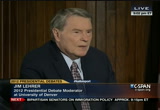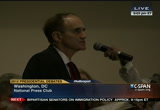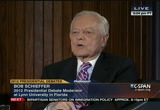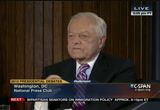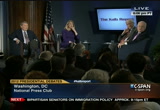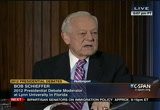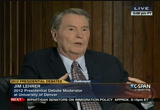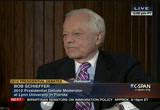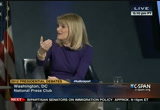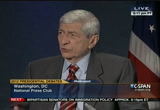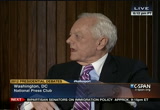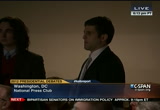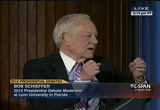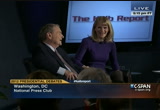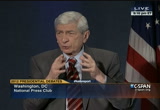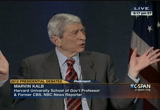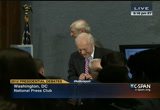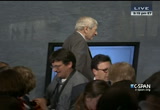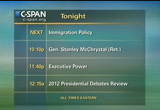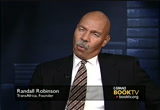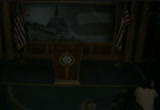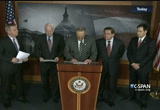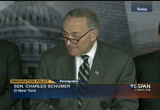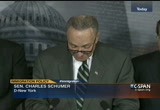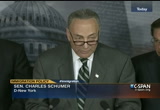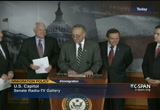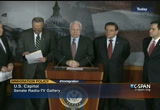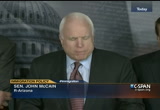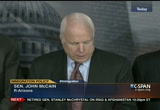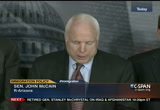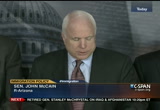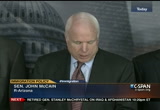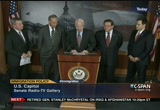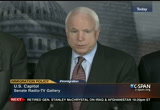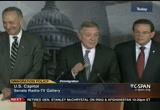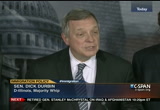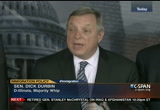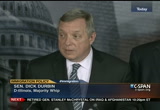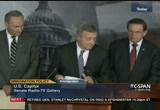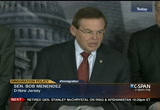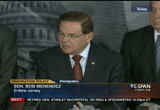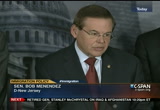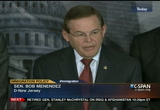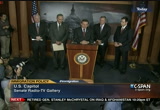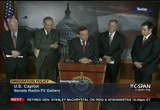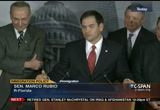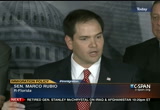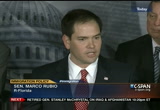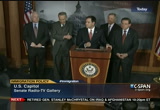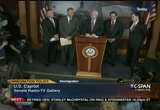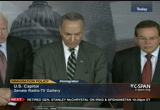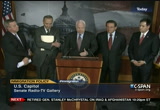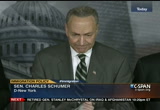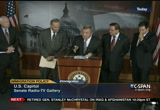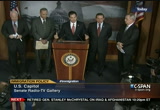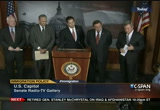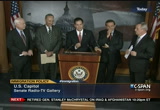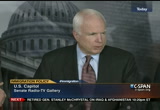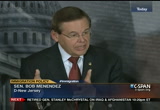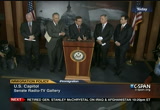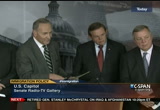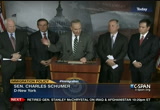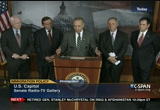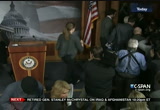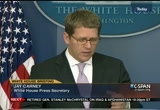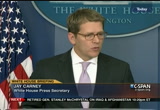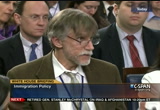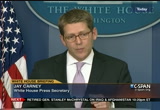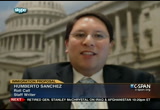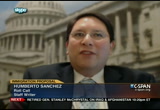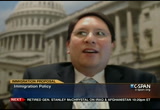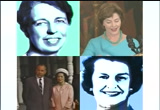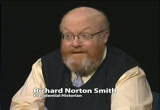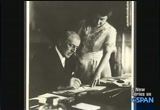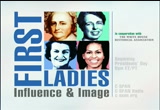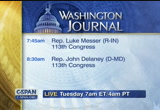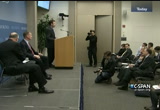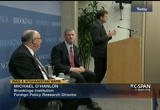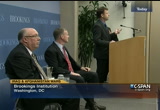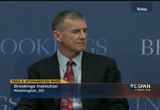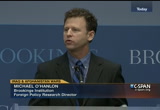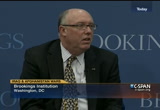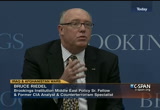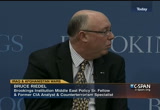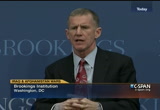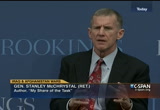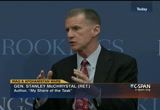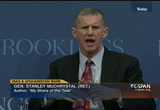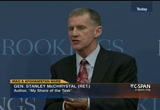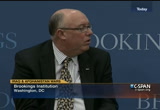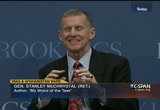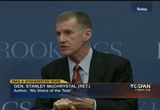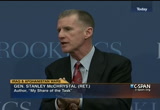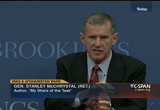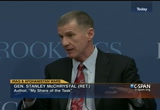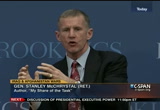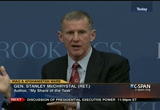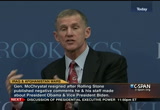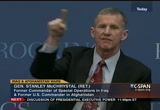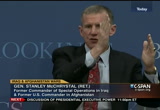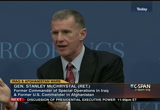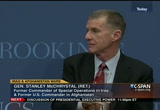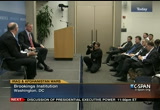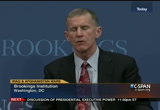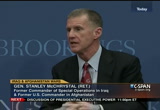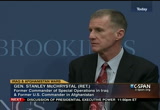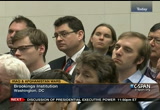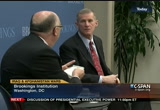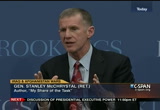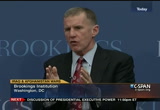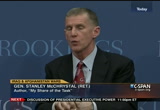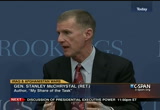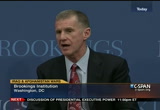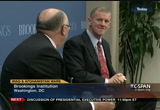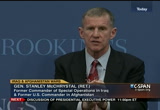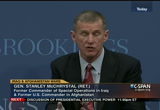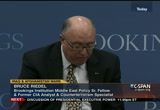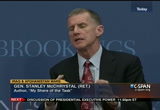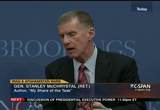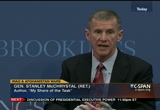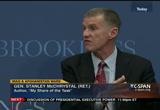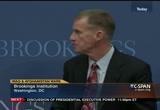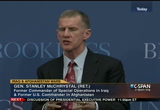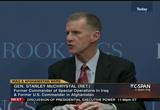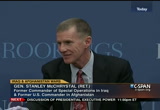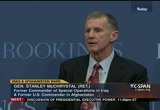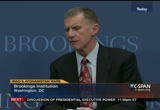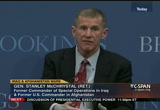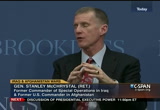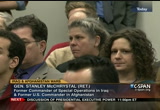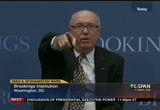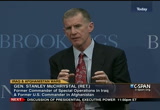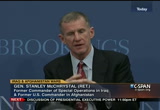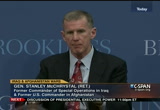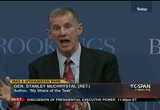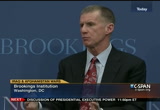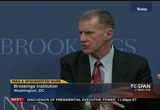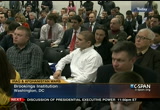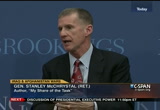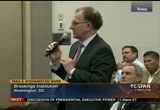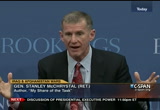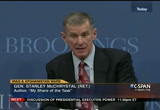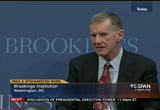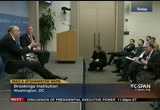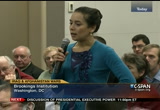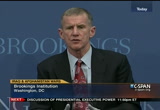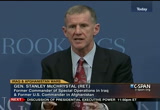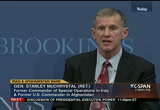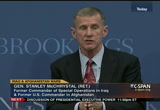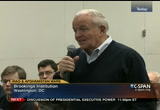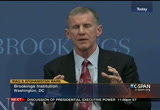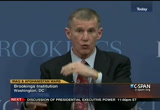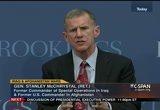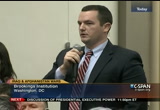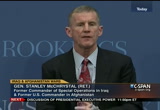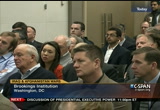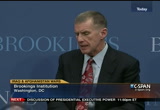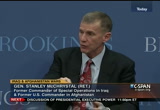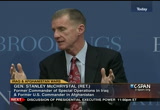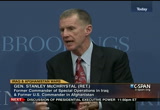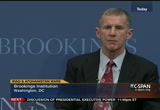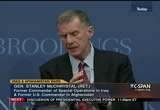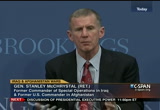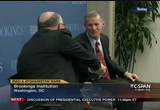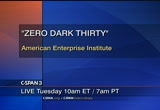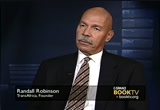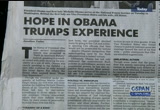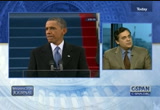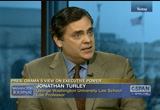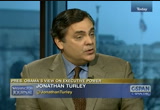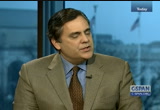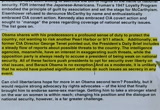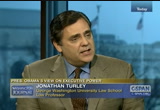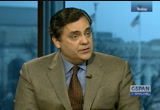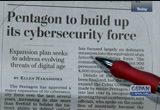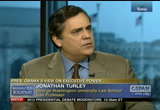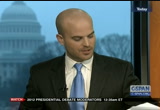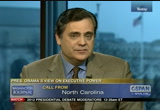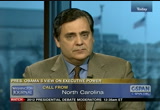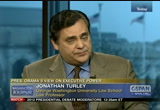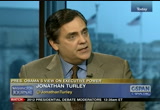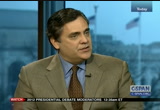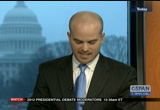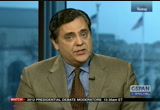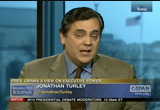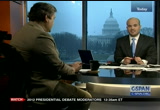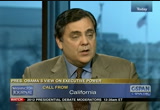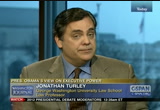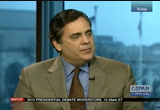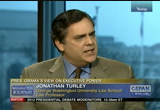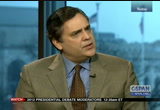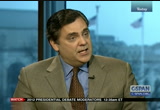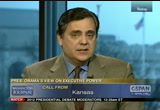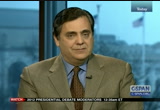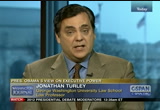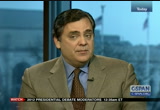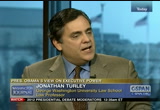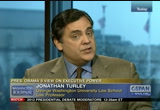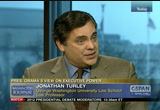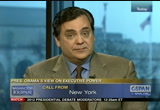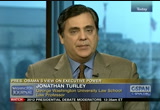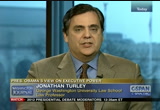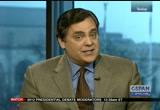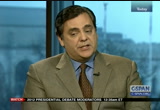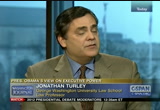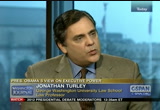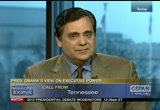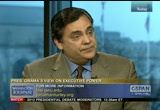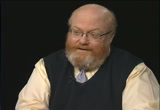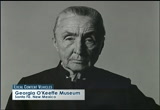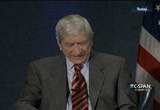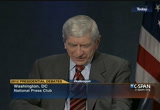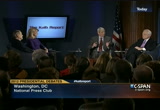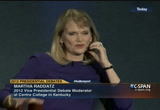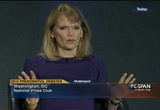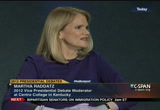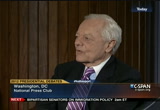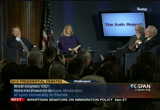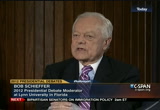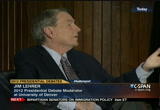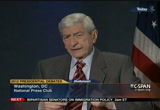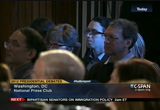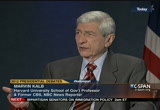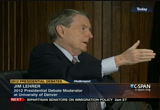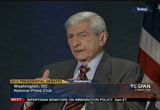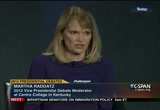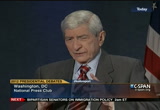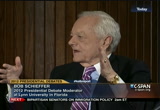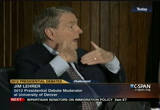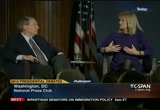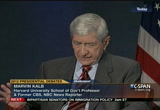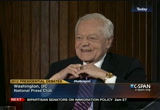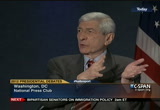tv Politics Public Policy Today CSPAN January 28, 2013 8:00pm-1:00am EST
8:00 pm
statewide conversation, and together we will find a nebraska common sense solution. thank you. [captioning performed by national captioning institute] [captions copyright national cable satellite corp. 2013] >> in a moment, live coverage >> in an hour and 15 minutes, a group of bipartisan senators speak on paths to cit izenship and then jonathan turley on obama's use of executive power. now, three of the moderators of the 2012 presidential debates. this is just getting started. ♪ [applause] .
8:01 pm
>> hello and welcome to the national press corps and the kalb report. i am amrtimartin calb. most would agree for the 2012 election being too long, too loud, and too noisy. except for the last month, with three presidential debates and one vice-presidential debate. 70 million watched the first and 60 million watched each of the other three. only the super bowl did better than that. in 11 of the last 14 debates, there have been these debates
8:02 pm
and they are a fixed feature of the political landscape. we have a wonderful opportunity to talk to three moderatores of the 2012 debate. to my right is jim lehhrer, who has done 12 debates. nobody will catch up to that. the most honored former anchor and prolific author and winner of every prize in journalism. to my left, bob schieffer, anchor of "face the nation" and an author and winner of many journalism awards, and martha raddatz, the chief global affairs correspondent. she spent a lot of time in iraq and afghanistan and winner of
8:03 pm
many prizes for her reporting. candy crowley cannot be with us because of a family political e. we send our best to her. jim and bob have done this debate stuff before. for martha, it was a first appearance. you have done so many interviews in your career. was this any different? >> not at all. [applause] [laughter] >> janet brown called me. i said, i'll take a vacation and go do the debates. it was so different. i was not covering the campaign. i was running around the world. i basically crammed into nothing
8:04 pm
but study -- and did nothing but study, like studying for the sats, and then taking them in front of millions of people. when i first got the call, i was so out of the loop, with how they do it that i remember janet saying to me, so how many are there? we would like for you to do the rest of the debate. the fourth vice presidential debate. that is how much that i knew and i told my family, when she called it, it was right after, you have either won the lottery or you have been told you have a terminal illness. >> you did the one vice presidential debate? >> there was only one.
8:05 pm
>> the gop as you to refer to congressman paul riot as mr. ryan, but you did not. >> the day before, one of the people at abc got a phone call, from one of his people and said it -- there is disagreement with the commission and we get to be called whatever we want to be called. i am not paying any attention to that. i am driving handcuff i am in kentucky and i get the call, and this is ed gillespie. he says, we have work this out and you will call him mr. ryan. and i said, what about the commission?
8:06 pm
he said, this is fine with the commission. so you think at the beginning i will say, vice president joe biden, and paul ryan? there was no real agreement. >> have either of these political parties ask you to do something other than that. >> that was the only contact i had with anybody and frankly i just put it out of my head. i fought -- they ask me to do this. >> and there was no influence -- i never had contact with the campaign and you had the hardest in that you were covering this. i was off in the corner. >> this was not a new experience for you. this time you ask for cbs not to
8:07 pm
have you report on the other debates because you wanted to avoid even an appearance. so why that attitude of the first time and not the first to? >> what is different is the scrutiny was so intense. there used to be about -- 10 people that wrote about these things. another are 700, -- >> we will get to that. >> just to give you the example. nobody holds back anything anymore. i can remember when people would write letters to the editor, and they would get it out of their system. now they just pressed -- pressed the send button. someone showed me the messages
8:08 pm
that people were tweaking, if that is what you call it, on the night of the debate. one of them said, who is that old guy? is that one of those old guys on the muppets? and it was sort of like that. but i kind of understood that in the beginning and i thought it would be a good idea if i stayed under the radar, and waited till my debate came along and to cbs at the beginning, they do pay my salary and they expect some work for that. then they decided maybe this was a good idea. >> was there anything special about this debate? and you were the last one? >> this was of very close election.
8:09 pm
someone asked me if i was surprised about the outcome, and i was not but this was so close and the blue states were so blue and so red, i would not be surprised if it went the other way. all i knew is that this would be very close election. >> jim, you have done 12 of these, i assume that each time you prepared in a similar way, with a very intense preparation. what have you learned, about candidates for the process of presidential debates? what have you picked up? >> there are several things. number one is this is not about the questions, this is about preparation so you can listen, intelligently and make some quick decisions in the new
8:10 pm
format where you have to react and all of that sort of stuff. it is about spending hours and hours trying to get enough in your head so that can -- if candidate a says something, you know if this is something important to say or something they have said before or whatever. and you bring the context with you, and that is the number-one thing. and the other thing is it is never about me. it is never about the moderator. these debates are designed -- i know some moderating in a debate as practiced journalism. the debate is among the candidates and for the candidates and for the public and has nothing to do with the people who are asking the
8:11 pm
questions and doing the time and all of that. it is a function of the democratic process, that is called the debate. and those are the things that come out of it. >> it is obvious that in 2012, we were at new heights of political polarization in the country itself and i wonder, why do you think, and i will turn to you first, why was the so much criticism of the moderator's this time, which had not been the case in earlier debates? >> i did. most of this dissipated over time because the initial criticism was that it came from partisans who thought that barack obama did a very poor job and those people could not criticize obama so they had to
8:12 pm
criticize somebody and had to criticize me or the process but once they realized it did not have that much to do with whether obama did well or mitt romney did well and had more to do with the two of them, that kind of went away, but the intensity of it was because there was this dramatic difference, with what happened? the moderator did not do this -- i now like to be criticized, it's not one of my favorite things to be but -- as i said, it dissipated and is gone, and most of the people who did the criticizing, many of them have come to me afterward and said, i am sorry. >> he said of the moderator
8:13 pm
should be seen little and heard even less, and in use of the moderator should stay out of the way of the flow. that being a very valid point of view, why not challenge a candidate who, you are listening to someone hide something beyond reality or live or simply mislead the public? why not take that among yourself? >> i would if those were the only events in the course of a presidential election. by the time youby the time you , we got to october 2012, the
8:14 pm
campaign had been going on two years. and this is a lot of the process but this is not all of the process. if the candidate who says something and it is the responsibility of the first candidate to challenge -- >> you do not feel that it is your job as a moderator to be part of this. >> for me to facilitate, to do something about it, yes. >> when you were doing your debate, the vice presidential debate, you appear to have a different point of view because i remind you, your first question about libya was rather sharp, this was a pointed
8:15 pm
question. and you were clearly not just setting this up, and a sitting back, you were part of this. i am trying to understand if we are witnessing two philosophies in journalism at work. i have a feeling bob may agree with jim on this -- but i have this impression from you, anyway, that you had a somewhat different approach. >> i worship these guys and they are fantastic. i read that jim's book and -- that was part of my homework. but we all bring a different style and to me, i was chosen because i was a journalist. i did not believe i could lead
8:16 pm
to someone's defense and lead to the others defense but if i ask a question i want an answer. this is my style. i went through this thing when i was first chosen, thinking, i am not george stephanopoulos, but i was chosen for who i am and i was chosen for whatever body of work and have that i am proud of and i felt that -- the only thing i would say is different, i spent a lot of time on the questions. i crammed my head as much as i could and remembered things, but to me, i did what pointed questions and i wanted answers. we all have interviewed public figures and usually get 20 minutes and 18 minutes and you don't want to hound them over
8:17 pm
one topical item -- you cannot help but be part of this. you are looked at because of the questions you ask and what you contribute in the wake of that debate. >> there is another question having to do with the moderator's, and that was this business of, the political party is getting an answer to the question, what is the sistine mets going to be devoted to? devoted to economics or foreign policy, iraq and iran, what ever it should be. at cbs we made a deal about never giving you the questions or categories, because you are supposed to keep that distance. >> do you feel any sense of
8:18 pm
discomfort at having to participate in what you did this time. >> this is the first time i have that this way and this was new, and basically -- janet called me and said, this time we want to divide this up into six categories, and i said, fine. you did not have to say in what order were anything but i think to in really don't need today's sophisticated world. >> but you did. and this hadn't happened before so why was the change. >> with the commission said to me was that they were keen on two things. and the commission is running this. the three of us and candy are not rolling this. >> by your jim lehrer.
8:19 pm
>> -- you are jim lehrer. >> this is how they ask and here is how the imitation goes to the debate. and if under these rules, would you do this certain fang -- i found out what they propose and made the decision, i would do that and here is what they said. because i was like that as well. the feeling was that the commission wanted to make sure that in the mind of the public this was a debate between the candidates, that this was not a gotcha game. this is not about reporters trying to embarrass people asked him who the prime minister of whenever this. let's open this thing up in the new 24-7 world, let's make these
8:20 pm
debates different from everything else. >> and this is to inform, in the hand, and you want the american public to know who these people are and i actually think -- let's face it, there are not that many surprise categories. >> if they have said, we have to see the list of categories and we will decide which ones that you can use and you can't, that would be a different story. >> i would remind you that three of mind -- six of mine, three of them were the economy. and that really stunned everybody. >> and even getting into this, this is the experience of the league of women voters, they sponsored the debate in 1976 and
8:21 pm
1984 and for the sake of transparency i was one of the reporters that ask questions in 1984. when we finished with that, they pulled out of the sponsorship and argued at the time that there was too much party interference and they said that they had no intention of becoming an accessory to the hoodwinking of the american public. i think that this is terribly tough language, but my question -- this is overstated. >> but my question to you is not as moderators but as reporters. is this something where there may be the beginning of too cozy a relationship between the parties, and the public? i did ally don't -- foreign policy debate and two of my sections were the middle
8:22 pm
east. are you going to talk about foreign policy without talking about the middle east? >> it is so obvious, why do this? >> if they don't want to do this, this is fine with me. >> one thing you want to remember is these debates are about substance, and they are about the middle east and the economy, but what they are really about are the candidates, and who these two people are. do you like them, do you have a feeling of trust? you take the measure of these individuals, and you ask them about anything, and the debate would still have a value. at that stage of the game in october, most of the people who are interested have already been falling the campaign and know the differences about issues.
8:23 pm
>> and we could have asked about anything, even as an economic question and get anything that you want. >> we spend a lot of time talking about education in the foreign policy debate. >> when you were there in the middle of the first debate, the one that the president was said to have them poor, as this was happening, was that your impression? >> no. >> what was your impression? >> the impressions that are going on, i considered more than one thing at a time, and i believed that romney was doing better and i thought that he was doing well. my own rule is that mitt romney is talking, and obama is standing here, i only look at
8:24 pm
mitt romney and i never look at the other candidate. i don't want to be a party to his reaction. the consequence is that when mitt romney was talking i did not know, even though i was closer to him than anybody, i was not watching the reactions of barack obama. the only time i looked at him as when he was talking. i cannot help but notice a couple of times he did not look at me, i did not have the impression. >> in the vice-presidential debate, did you see or hear anything that we, as television viewers of the debate may have missed? >> it is one thing from jim's book, you may miss the moment, on television.
8:25 pm
i don't think -- i think the one impression, for the same reason, i had no idea that all ryan was 753 glasses of water. this was like a saturday night live skit. i thought, i am so thirsty. these guys are talking and they have had no water. i do not think that i missed this. one thing that happens in the debates is the candidates come in, and they are ready for what ever debate that they are ready for. i think that joe biden thought that this would be a little bit more contentious. it took him awhile to get
8:26 pm
adjusted to that. i thought that this was a very interesting thing, to realize that. that this was happening with the candidates. what would you get to see those rehearsals? >> now that i have thought about this at this very moment, i don't think obama was prepared for what romney was doing. i was not -- >> having done this three times, you cover all the people that you interview in these presidential debates, what do you pick up, and what are the ingredients of political success? your interviews with people who have risen to the very top, what is it about them?
8:27 pm
>> every debate is different. you talk about the things that were missed in the 2008 debate, which i moderated between president obama and john mccain, these are two very different people and personalities and when obama would speak, john mccain would furiously taking notes. he is always over calf and it anyway. i love the guy and i like him, but he would take all of these notes and when you look over at obama, when mccain was speaking, obama never took a note. he tried to maintain absolute, direct eye contact, with john mccain almost as if, you will not rattle my chain.
8:28 pm
and he just keep looking at him and the only time -- during the debate, i still, do not know why he did this, he picked up his pen and he would draw a straight line across the notebook. if this was some sort of as an exercise or maybe he was putting 400 pounds of weight on this or whenever he was doing -- he always did that and i've never had the opportunity to ask why he did that. during the primary debates with romney, and i talk to him about this, he always wrote something down at the top of this note but and i asked him, what do you write down there? he said, i write down, dad, and it reminds me of my father, and he is my hero. he says i just think of him and
8:29 pm
this helps me. i have. myth that during this presidential debates i looked down, he wrote something down but i was never able to look over far enough to see if he was writing down his dad's name. >> i want to remind our audience, that this is "the kalb report" and my guests are jim leher, martha raddatz and bob schiefer. a question, you believe that these debates make our democracy better. do these debates -- make our democracy, as we would like to think of it, does it make it
8:30 pm
better? >> 100 percent, yes, without reservation. because they are the only times in the course of a presidential campaign when the candidates on the same stage at the same time talking about the same things in a comparative way for everyone who will vote in that election, can see them in action and whenever they are doing, what ever they are talking about, that is the only time they can do that and anytime that you can do that is a good step in the democratic process. >> you will not agree with that? >> i think it is better for democracy and a terrific experience for the american public. and it is kind of a coming together. i now believe in the guy you, either.
8:31 pm
i would never come in there with a gotcha question. you have this sense that you are doing something very important. like you've never done before, that this matters and you are a voice in helping the public understand, that your help in the democratic process, those debates help the democratic process. it is an enormous responsibility. >> what is your proof? i will ask you got to question. >> 65 million americans watched, and 65 million americans learn something and they are debating the debates the next day. they are not tune in to reporters to hear, they're not listening to what they want to hear, they're not hearing people wanting to get on the news that
8:32 pm
night, and people asking these questions. >> let me give you the proof, the debates on the last political event that we have for you can get people from both sides to listen to you, at the same time and watch at the same time, and all that you have to do is look at the television ratings, and the breakdown of the democrats and republicans -- republicans watched the republican convention, democrats watched the democratic convention, and the washington of today is not the same as in 1969, the democrats and republicans don't like to be in the same rooms and they don't like the folks back home to think that they are consorting with the enemy but they will sit through listening to barack obama so they can hear what mitt romney has to say and democrats
8:33 pm
will do the same. and this is the last event where you can say this. this is a good thing. the evidence is that political polarization is worse at this time that has been forever and a day. >> political polarization is because of a lot of different things, but one of the reasons that we have this is because we don't all get the same stuff anymore. you can get the news delivered to you from any point of view you want. if you want a conservative point of view, democratic, a liberal point of view, vegetarian view, you can find it, and the result is that people at one end of the spectrum simply are not always getting the full story. >> i have to point out, there
8:34 pm
are many scholars in this country who have done studies of the impact of the presidential debate on their luck -- the election itself and many of them have said that these debates are grand and wonderful things, but at the end of the day they don't mean all that much to the voters. by the time of these debates, -- people have more or less made up their minds and it is much more like in 1992, it is issues that affect individuals who are going in to both that this wonderful and informative television debate. >> there is no question that the economy is what the elections are about. but i would point out to the
8:35 pm
scholars that there were two chefs in public opinion during this campaign. the first one came after the first debate. when suddenly, here came romney and people said, that look like obama was going to run away with it, and the second change came at the end of the democratic convention, after the speech by bill clinton. these chefs do change minds and i think fat they are one of the best parts of the campaign process and i think that we need to have more debates. >> but let me say to the scholars, they overlook the obvious and maybe that is why they are scholars. [laughter] no, that is applied -- that is not a put down. scholars need to go beyond the obvious. that is what makes them
8:36 pm
scholars. what is obvious is that 64 million people watched the first debate. four years ago was about the same number and there was no two-one change like there was in 2012 of what the debates too, they are confirming exercises. and the scholars tend to say, they did not change any votes and as a consequence the debates did not matter. people watch those debates, all the democrats and republicans watch, and if you are a republican you are watching your candidate in your already leaning that way. i liked this guy, and i am taking the measure, and there is a small percentage of people who are legitimately undecided. but the debate is for everyone.
8:37 pm
and what this does is rally the supporters as much as it does, -- as much as it causes people to change their minds or make a decision, and to me, that is hugely important. >> in these debates, as a participant -- who has the advantage, the incumbent or the challenger? the incumbent because he can excel -- he can speak with greater authority, or the challenger, because he does not have a greater authority? >> it depends on who the incumbent is, and the non- incumbent. i know that -- going into my debate there was being written, about how paul ryan must be -- he must be studying up on
8:38 pm
foreign policy. but on the other end, people wrote that joe biden was more nervous because he did not know a fair bit about. -- foreign policy. with the incumbent maybe you have to go over a higher bar, and as the non-incumbent you just have to prove yourself. >> was there any question you could come up with, was the one that you could have passed either one of the candidates that may have put them off stride for a moment? >> all three of us think -- i wish i had asked this, or that way, but it, i did not try to do that, i just wanted to know what they knew. and there is this line that you don't want to look like a
8:39 pm
complete jerk. you don't want to ask that question in a way that makes you look like it is just too cute, or were you trying to throw them off, let's go back to bernie shaw. i was out there as a somewhat young reporter, a local tv reporter and i remember hearing that in los angeles, and it was stunning. in the end, talk about a debate that changes things. >> the s, if this wife was raped would he believe in the death penalty. and i love that -- michael dukakis said, he was over brief that he had his answer is there and he did not think about it. there is just the moment where the moderator my ask, there is
8:40 pm
the over-briefing. one of the debates with the cheney and joseph lieberman, lieberman has staring directly in the camera the whole time, he seemed to weigh more brief. >> bernie shaw has the view that if he has the opportunity to talk to someone who may be president of the united states, or who is, it is not special that this is a presidential debate. if you have the opportunity to ask a question about a major issue, take the opportunity because most of the time, in his view, the politician will use you and your network to sell his point of view and himself. if you have the opportunity to do your thing and ask the tough
8:41 pm
questions, that is the bernie shaw line. we learned in 1960 that kennedy arrived tan, rested, ready, and nixon was pale, 5 o'clock shadow, restless. at that time, studies suggested that kennedy won the debate on television but nixon won on radio. he came across as authoritative. you guys have been at this. what is important in our world of television that is so critical? what is the key thing? a wonderful, clear policy
8:42 pm
presentation or wearing the kind of socks you are today. really lovely socks. what grabs you like mondale in 1984, where's the beef. senator, you are no jack kennedy. the line or the more structured presentation. >> people vote for president. this is a different vote from anything you have to cast. if you vote for councilman, you vote for issues. will he keep 7-11 up on sundays? will he zone your neighborhood to keep out mini-warehouses. but the vote for president is different and most studies suggest people vote for the person they have the most
8:43 pm
confidence in in a time of national crisis. i happen to think this is a good reason. in that case, communication skills do matter. the american people are not stupid. they are generally pretty smart. they pick the right candidates. you get a fuller picture of the person running for president, not just the talking points but you get to see him react and how he reacts when the pressure is on. >> or she. >> or she, next time around. >> the ability to communicate is critical. you can have the greatest ideas in the world but if you can't communicate them, forget it.
8:44 pm
>> that is about leadership. it is not just a performance in a debate, it is leadership. >> i want to test you on a different narrative. there were 10 million tweets in the first debate. the most ever in american politics. if this was important to you as a moderator. if it was important, or if this fact alone has any importance at all, please explain it to me. i want to stop with martha. >> twitter -- it is out there. there are voices out there with influence. we as journalists -- it is a great journalistic tool. >> how did it effect you as a
8:45 pm
moderator? >> i had some strange press the day before, for 15 minutes, rattled me. i will tell you. it effected me as a mom. my son is on twitter all the time. if he is in the bedroom, "are you coming to dinner." but there was such nasty stuff. >> directed at you? >> but my son said, "mom, there are crazy people who write mean things. " he's a football player. he said, "they have three followers." they all live in basements with 75 cats. what i want to do is a reality where i find those people and say, "what do you mean, you
8:46 pm
don't like my hair? yours isn't great either." >> do these bother you? >> i got millions of critical tweets, i understand. i didn't read them. >> you're a better person than i am. >> it -- quick story. when that debate was over, we went to dinner, kate and our kids and i came away from the denver hall to the hotel where we're having dinner, we talked about the debate and that stuff. we were just talking about the debate. it wasn't that obama had done poorly or that i was a fool. then one of the people at the table had one of these gadgets. >> like a twitter gadget.
8:47 pm
>> one of our friends -- they are tweeting this. >> they are saying all kinds of things. some of the stuff, you don't want to know. that was the end of it. then i heard about these millions fof tweets and knew some were critical. the bottom line, i felt good about that debate. no tweet and twitter, ten million twitters and tweets -- >> hashtag bobs purple socks. let's see how many we can get. >> relating to the new technology. we are caught right now in twin revolutions with politics and jouranlism and one -- journalism and one effects the other.
8:48 pm
your sense as a long-time political observer, with the impact of the new technology on the politics. >> it turned everything upside down. when i was a young reporter for the "fort worth star telegram." about 10 days out, there would be a whispering campaign that one of the candidates had a girlfriend on the east side. all the girlfriends live on the east side. as a reporter, we'd go check it out. if it amounted to anything we may do something. i can't remember if it ever amounted to anything. now, there are no whispering campaigns. if someone has a rumor, someone
8:49 pm
write sit on a blog and it is out there. we as journalists, we treat them as news tips. unlessvenever broadcast it it was true. not everyone follows the standards of mainstream journalism. have to decideans -- to i ignore this and hope it goes away. there is an old financial recourse. if i make a mistake nad libe anl somebody, cbs has deep pockets. you will sue this guy in the basement with the cat? there is nothing you can do about it. we are trying to come to grips and handle it. it has changed everything with
8:50 pm
how politics operate. >> let's look ahead to 2016, and look to the future for a moment. both of you said earlier you'd prefer there be more debates rather than fewer. do you think in this age of social media, where the patience of the american people is measured by the length of a tweet is limited. do you think they'd be able to tolerate more 90-minute discussions of serious issues? >> we get 60 million to watch them. maybe they would. what i want to see is six debates with the first coming immediately after the last political convention. if the democrats are last, next week, have the debate, if the
8:51 pm
republicans are last, next week, have the debate. i think they can set the tone. if you can have that first debate as quickly as possible it could change the tone of the debate itself. at least it would get it off to a serious start. i would also say -- since you asked me, i think the right format is to have the two candidates seated at a table with the moderator. that seems to work. the last two, that is the format. i think you cnan exercise better control instead of standing behind a podium. if the debate commission asked me. they don't have to ask me, i'll tell them. i would suggest to do away with
8:52 pm
the town hall forum. it does not work in my view, with too much show business into it. you get the candidates performing and walking over and getting in the other guy's face. >> it shows something about the candidates. i would say -- i like the four debates. i was done with those debates. you talked it up perfectly. >> the idea, jim, of doing a debate -- if we do more debates, if that idea is seriously considered, what about doing that 90 minutes on one subject? >> that is why i'd want to do six. you can -- have one subject for the whole 90 minutes, and do it by subject rather than format.
8:53 pm
and what people think about the town halls, my experience, the moderator chooses the question. you'll get 22 questions, there is no give and take. it's not a real town hall. but it does have some appeal. in terms of the subject, it is not the place -- the town hall meeting is a different kind of thing. but if you did one subject at a time, i think the evidence is out there and the public would watch this. 67 million people sat at the television and watched those debates. another 16 or 20 people,there were 100 million people watching some or all of the first debate,
8:54 pm
and the same numbers continued through them all. >> we have a little more than a minute to go. i want to ask -- martha, why do you think they asked you to do a debate? >> i don't know. maybe because i wasn't covering the campaign? i was covering the whitehouse and i -- that wasn't my favorite assignment. >> if they asked you in 2016? >> it is an honor. i hope i was chosen for my body of work and am a reporter that people trust. >> why, aside from the color of your socks, do you think the commission came to you a third
8:55 pm
time? >> i work cheap. [laughter] i have no idea. maybe because i'm older. >> would you do it again? >> no, i think i've served my time here. i'll quit while i'm ahead. >> jim, i asked you this question. you said, no on 2012, and you did it. in 10 seconds, can you say while you'll say yes again in 2016? >> the answer is no. i won't do it in 2016. >> friends and colleagues, our time is up. the tyranny of the clock again. you are familiar with the tyranny of the clock. but i want to close with an
8:56 pm
editorial point. i think these debates are essential to the democratic process. as far as i'm concerned, a pat on the back to the committee on presidential debates. i want to extend my thanks to a wonderful audience. a great panel of moderators and all of you who treasure a free and vibrant press as the greatest guarantuer of a free society. as edwar r. murrow would say, "good night and good luck." [applause] >> ladies and gentlemen, what we
8:57 pm
do now, there are microphones back there and over here, and if you have a question, go to the microphone and i will recognize you, and it will be for a question. and if you start making a speech, i will cut you off. so don't make me be a mean guy. you can address it to the person you'd like an answer from. let's start on the right. >> give us your name -- >> my name is joseph burry, i am an alumnus of the graduate school of business. you had a great remark and a great question. do these debates promote
8:58 pm
democracy/ ? the people up there are major party candidates. >> not a two-part question. >> please ask it. >> my question is, other than mr. leher, who i commend, the other three did not follow the rules, which were simple. they were to be given one minute a piece, one minute for the question, two for response, two for the re-response. and -- >> i hear you. thank you very much. would someone on the platform answer? >> i think we did follow the rules. these were 15-minute segments.
8:59 pm
you had a response and a discussion. >> those were not the rules. >> that is another debate. >> i don't want to get into ad debate here. >> i'd liek tke to ask a questin about an issue that played a role but was never discussed, climate change. they expect reporters to ask about the future -- >> let me say one quick thing. i arrange my things by subject and what is most important. i was cut from the bottom to see how the discussions ran.
9:00 pm
climate change was on the list and i didn't get to it. one of my huge frustrations, small potatoes frustration. i thought the debate itself was fine but it was limiting in the subjects that couldcould of bee. i made the decision sitting there that we had to cut that. immigration and other things did not get in there, either. >> the fiscal cliff, was it part of the issue you did not get to, also? >> it came up. i decided we said enough about it. >> ok. out there, please. >> investigative journalist. i wanted to ask specifically to miss raddatz.
9:01 pm
the fact that the president attended your wedding. do you think that was handled right and given a second chance, would you have done it differently? >> i did nothing. i did not have to handle that. i will not comment about that. that was something that had happened two days before the debate. it had been in "the new york times" before that. i had to put that out of my head. that had nothing to do with what i did at the debate. nothing. >> thank you gary yes, please? >> my name is steve. i work in the news business. to the extent you are familiar, so some anecdotes about planned stage management about some of these debates and keeping people
9:02 pm
on time with their cues and not veering too far off the questions. thanks. >> keeping on cue. i will tell you a quick anecdote. my first debate in 1988, george h. w. bush worked -- vs. michael dukakis. george h. w. bush was the vice president and he gave an answer. high-tech, green light, yellow light, red light, and green light said you could talk, yellow lights that you could line up, red light said shut up. george h. w. bush in the middle of an answer, i stopped him and said, mr. vice president, your time is up. he pointed to the lights and said, i have still got some time. in my ear, i heard the voice of the executive producer saying, jim, he is right prepare. [laughter]
9:03 pm
in front of everybody i have ever known in my whole life -- [laughter] i said, i am sorry, you are right, go ahead. he looked at me and said, i forgot what i was going to say. [laughter] i wanted the biggest hole in the world to drop in and never be seen again. [laughter] i still do not know what happened. i do not know how i got it wrong. .> beautiful, yes, plea yes, please. in would gingrich have onwon south carolina if he repeated his performance in florida instead of falling asleep? would he have one to go to the primary debates? likewise, would obama have lost
9:04 pm
the election after the polls slip and showed romney was ahead. would he have repeated that performance in the next two debates? does that make the case that style is more important, sound bites are more important than substance. what is your reaction to that? >> these are questions we will never know the answer to. i think where governor romney made a mistake, i think, this is my sense of it and the way he reacted to the questions i asked, i think governor romney thought he was a hit going into the third debate. the nominees polls had suggested that. but based on some reporting, i believe he thought he was a hit when he went into that debate. he went into what a football team does when they are a hit in
9:05 pm
a game. he went into a prevent defense. that probably hurt him. i do not think at that time he was ahead. one of the things i base this on, i started out that debate asking him a pretty pointed question about benghazi. republicans were really criticizing the president for this. this was a place where if governor romney really wanted to take on the president, he could have done it. he just sort of skipped by that question and went on to something else. i think he was afraid he did not want to appear overly aggressive and i think that was probably a mistake on his part. >> the reverse was true.
9:06 pm
obama for the first debate. he thought he was a hit and thought he could coast and he paid a price for it. >> yes, please. >> i am a washington d.c. resident. my question is for bob schieffer. considering what you discussed about how most americans are watching news that is tailored to their political views and candidates are going on those news shows, this is one of the only opportunities for those 60 million americans to see a candidate willing to challenge them. do you think that changes the role the moderator plays in the debates? >> i was not one who said i did not approach this as a journalist. i do. i do think this is a place where you are there to give these
9:07 pm
candidates a chance pass and an opportunity to show who they are. like jim, i do believe when one can do it says something, it is the responsibility of the other candidate that if there is an inaccurate see there, if there is a different point of view there, i think the other candidates should have the first opportunity to make that correction. >> what about the second opportunity? >> i tried at times when i thought it was not being addressed to address that. i think you are trying to find out who these people are. and what they are about. and what they would do if they are confronted with these situations that are going to come up in the presidency. like jim, you are not electing a moderator. you are electing a president. everybody who moderates one of these debates has to keep that in mind. to your point, you are
9:08 pm
absolutely right. we are not all getting the same stuff anymore. the only way you can be truly informed is to consult a variety of sources before you make up your own mind. >> let me add a little bit what i said. you are obviously functioning as a journalist. not in a way i would be if i were doing something on the news hour or bob was doing on cbs, or martha on abc. it is a different form with a different purpose. yes, the skills involved that i use and we used, whoever does, our basic journalism skills, you have to know what the hell is going on. you have to know how to question and listen, those are journalism skills. i did not say that very well so thank you for the opportunity to correct myself. [laughter]
9:09 pm
>> yes, please. >> i am an engineering student. one of the things i love about the debates is they serve to detach the candidates from these big campaign machines and let you see them for who they are as people. where is the line between gotcha questions and questions that do not hit the point in terms of getting the candidates to be real simmons. humans? >> you are trying to get people to say things they mean, not what they did not mean. that is why i do not think some gotcha thing works. there are a lot of things. if somebody asked me who the president of some country, there
9:10 pm
are a whole lot of countries, i would not know the answer. i do not think that would have anything to do with whether i am an informed person. it is just not my specialty or something. i think that is where the line is carried you are trying to get people to say who they are and what they mean and why they have taken the positions they have taken, not to mix them up. you will find out soon enough if they know what they are talking about and more than two paragraphs. >> one of the things you are trying to do is be fair. and let them talk about what they want to talk about. i think the difference between intervening is if i ask a question and i want an answer to that question, yes i agree if they do not answer my question i might try to press it, but if someone else is challenging them on accuracy from the way they see it, that is very different.
9:11 pm
there is a point of view sometimes when people, if people intervene and say, but wait a minute, that is not the way it happened, there is not always an absolute truth to those things. i think if there is a question there is a clear answer to, you do have to say, it was four o'clock and not 3:00, if it is anything beyond the ones, i think you let the candidates challenge each other. >> the american people for two years prior to the time you have the presidential debates, were listening but not learning anything car. it was up to you. you ask the question and 60 million people watched and suddenly we really understand what it is they are saying? why should we believe the candidate trying for two years
9:12 pm
and probably 20 before that to be the president of united states, say something different to you more meaningful and honest than he has been trying to say for two years? why? >> it will not happen. if you are looking for candidates to say something different, forget it. it is the opposite. you want to know what these people believe. >> do you think you know that after two years? >> i am not sure you do. maybe those of us who it is our business to follow the campaigns minute by minute and read the paper. most people are not doing that. there is nothing wrong with that. they do not have time >> that is the form where you do have to change -- >> people are focused on this. he may have said it 100 times
9:13 pm
but it may be the first time you heard it. >> and heard it in a comparative wage. >> that is different from what he thinks. >> yes, please. >> i am a young professional in d.c. i question is for bob schieffer. you said all elections come down to the economy. you can make the argument president obama centered his candidacy on social issues. what about today with the fiscal environment the united states is facing? what we have better discussions during these debates that centered more on the economy? >> i think in the end, this one did come down to the economy. the president may be basing his second term on social issues.
9:14 pm
if you take his inauguration speech as a guidepost to where he wants to go from here. but i did not hear him to talk a lot about the campaign -- during the campaign. the economy began to get better. i did not see him spending a lot of time talking about gay rights during the election. i did not hear him talk very much about gun control. i think it was mentioned once in one of the debates. i think they thought they had to get -- what they concentrated on, in some ways, this was not so much an election about issues as it was about identifying their voters and getting their voters to the polls and recognizing the demographics in this country were changing dramatically.
9:15 pm
they figured that out and how to get people to the polls and republicans did not do as well. i think the core of the president's message was the economy. >> the last question because we are running out of time. >> this is for martha raddatz. you seem to have gotten a lot of criticism during the vice- presidential debate, allowing joe biden to run all over you. the cost of laughing and the interrupting of paul ryan, particularly when he was talking ann. an armed ira how can you say you had any control over that whatsoever? [laughter] >> i want to answer you fairly, i do.
9:16 pm
i think when we came out of the debate, joe biden had 45 seconds more than congressman ryan. i think congressman ryan felt it was fair. that is what i can say. i think congressman ryan afterwards could not have been nicer. both of them work. both of them thought it was there terahertz -- it was fair 1/2. . [applause] >> in the distinction that has been made tonight between moderator and reporter and everybody being a reporter but serving a function as moderator in these presidential debates, we have a rich pool of journalists in this country because it is a free country. you have got awfully good reporters. i want to make the point that
9:17 pm
this weekend, we lost one of the really great reporters. the kind of reporting stanley did in vietnam, the 13-part series he did on cbs, his book on vietnam, the history, are going to leave students and all of us as citizens enriched by the spirit and energy and diligence stanley put into that work. we are all diminished by his departure. in a way, enriched by the knowledge that good journalism is the essence at the heart of a free and open society. so long as we have good journalists, we will continue to have a free and open society. thank you all very much for joining us. [applause]
9:18 pm
9:20 pm
>> in a few moments, a bipartisan group of senators proposed immigration changes. in a little less than an hour, a retired general stanley mcchrystal discusses the wars. then a law professor on president obama's use of executive power. then later, a review of the 2012 presidential debates. several live events to tell you about small morning -- tomorrow
9:21 pm
morning. we will hear from health care professionals about the apparent doctor shortage. also at 10:00 on c-span3, the american enterprise institute discusses "0 dark 30." -- "zero dark thirty." >> one cannot count the times americans say we're the best country in the world. what a marvelously stupid thing to say. of all the countries in the world, everybody thinks their country is pretty good. why do we have to believe that we are the best?
9:22 pm
what does that mean? and why do we have to assert it all of the time? and what does it mean to other people who consume it? american products co of from the world, information products go around the world. and we teach them not to like us. gratuitously. >> author, activist, and transafrica founder randall robinson. >> a bipartisan group of senators is proposing changes to the immigration law, that would include a path to citizenship for most of the estimated 11
9:23 pm
million illegal citizens in the u.s. they spoke to reporters for about 45 minutes. >> we want to thank everybody for joining us. and we're here to announce today that the five of us here today and eight of us in total, including senators mccain, rubio and bennett have come together on bipartisan principles for immigration reform legislation that we hope can pass the snot in overwhelming fashion. we still have a long way to go. but this bipartisan -- sorry, we still have a long way to go but this bipartisan blueprint is a major break through. it's our hope these principles can be turned into legislation by march and have a mark up by the committee with a goal of passage out of the senate by late spring or summer. senator durbin and i spoke to the president yesterday to update him on the group's progress. and he couldn't be more pleased. he strongly support this is effort. the key to our compromise so to recognize that americans overwhelmingly oppose illegal immigration and support legal immigration. to this end our framework contains four basic pillars. first, we create a tough but fair path to citizenship for
9:24 pm
illegal immigrants currently living in the united states that is contingent upon securing our borders. second, we reform our legal immigration that will build the american economy and strengthen american families. third, we create an effective employment verification system that will present identity theft and tend hiring of future unauthorized workers and lastly, we establish an improved process for e admitting future workers to serve our work force needs while protecting all workers. other bipartisan senators have stood in the same spot before trumpeting similar proposals. but we believe this will be the year congress finally gets it
9:25 pm
done. the politics on this issue have been turned upside down. for the first time ever, there is more political risk in opposing immigration reform than in supporting it. we believe we have a window of opportunity to act. but we will only succeed if the effort is bipartisan. by their presence today, my republican colleagues are making a significant statement about the need to fix our broken immigration system.
9:26 pm
9:27 pm
we want. that's why our framework says we can address the status of people living here illegally while securing our borders and creating an immigration enforcement system that ensures we will not again confront another 11 million people coming here illegally. on day one of our bill, the people here without status who are not criminals or security risks will be able to live and work here legally. that will make it easier for them to learn english without fear of deportation. but to prove to the american people that we are serious about permanently ending illegal immigration to the u.s., we say we will never put these individuals on a path to citizenship until we have secured our borders and combated the people overstaying their legal viz sass. we are asking our colleagues in the house and senate to join us in this difficult work ft it's time to work together to pass legislation that improves our security, grows our economy and ensures that we will continue to be a nation that lives up to the values of our founders. i'm going to turn it over to senator mccain in a minute. i want to say he has been the grew in our group. his wisdom and strength and courage, his steadfastness and many other adjectives that i'll skip at the 340e789 have really been inspiring to me and all of us. and i want to just say -- you want me to go on? and i want to say that every member of your group, including senator gram who couldn't be here, senator mccain has a statement from him, have really been terrific in terms of
9:28 pm
understanding that we have to come to an agreement, we have to meet in the middle. that the mission of getting a bill done to strengthen america is more important than any of us clinging to a specific belief. and so i'm optimistic. i'm truly optimistic, more than i was when we had our first meeting in december that we can get this done. and i want to thank every one of the members here. it's been so far -- we're only a part of the way done but it's been a great experience so far and one that gives all six of us a great deal of optimism. >> i'd like to thank you the senator for his leadership. i'd like to thank the democratic leader. there has not been anyone in america who has fought harder for the so-called dreamers than dick durbin has and he will continue to have the gratitude of many americans.
9:29 pm
my friend senator rubio who is a new important voice in this immigration reform. senator menendez and senator gram who is uncharacteristically absent from this gathering. as the senator mentioned it has a first step in what will be continue to be difficult but achievable. i don't have to remind anyone the last major attempt was six years ago. we will again attempt to get the resources to secure the border, streamline our immigration system and create a tough but fair path to citizenship for those here illegally.
9:30 pm
and i would like to testify again t security situation along the southwest border is not perfect. there remains several areas, particularly in arizona where people's homes are being invade and drug smug letters are crossing every night and they deserve the same level of security all of us have. there is no question, there has been a significant reduction in illegal crossings over the past five years. apprehension by the border control have dropped 70% from 2005 to 2012. but their work is not yet complete. greater focus need to be paid to drug traffickers and criminals that cross the border. arizona continues to be a major smuggling corridor and hub for drug trafficking organizations. to combat this, we need to invest in high-technology, proven surveillance systems that will give the border patrol ability to detect and apprehend illegal entries into the united states.
9:31 pm
it's achievable and can be completed within the next few years if we commit to it. the next important step is to ensure we don't repeat the mistakes of 1986 where we gave amnesty to 3 million people, promised the border would be secure and we're dealing with 11 million people here illegally. so that has to have increase in fines on employers that knowingly hire illegal workers. we have to have employment verification system that will end the hiring of future unauthorized immigrants. we need to shut off the magnet that attracts illegal workers. we will put in place a legal worker program to provide a humane and effective system that allows immigrant workers to enter the country without seeking the aid of human traffickers or drug cartels.
9:32 pm
any legislation that pass congress must establish legal channels for workers to enter the united states whether they are high skill, low skill or agriculture workers so we can free up officials to focus on those individuals intending to do our nation harm through drug smuggling, people trafficking and possibly terrorism. providing citizenship for dreamers, developing a measurement to determine when the board certificate truly secure. reforming our future immigration system to better meet the needs of our employers ensuring an exit system to combat visa overstays and creating a program that makes certain u.s. agriculture has the necessary workers to maintain america's food supply are some of the issues we've committed to addressing and solving in a bipartisan manner. and finally, we come to the most controversial piece of immigration reform and that's how to deal with the approximately 11 million people living in the united states outside of legal status.
9:33 pm
what is going on now is unacceptable. in reality what has been created is a de facto amnesty. we have been too content for too long to allow individuals to mow our lawn, serve our food and even watch our children while not affording them any of the benefits that make our country so great. i think everyone agrees that it is not beneficial for our country to have these people here hidden in the shad dose. let's create a system to bring them forward. allow them to settle their debt to society and fulfill the in necessary requirements to become law abiding citizens of this country. this is consistent with our country's tradition of being a nation of laws and a nation of
9:34 pm
immigrants. i'd like to read senator gram's brief statement. he says i hope the third time is a charm. i've enjoyed working with my colleagues in drafting these principles and believe we are off to a good start. the bipartisan principles represent a break through on instance and i hope they will be seen as a break through in forming a coalition to solve our immigration problems. the coalition must also include the president and the house of representatives. my hope is this bill will start in the senate and receive an overwhelming bipartisan vote. we are a long way from having legislative language but i believe 2013 represents us the best chance to pass immigration reform in many years. with a reasonable amount of political give and take we will be successful. however, if we fail in our efforts to pass comprehensive immigration reform, i do
9:35 pm
believe it will be many years before anyone is willing to try and solve this problem. we should have full understanding of how difficult it is. in the last couple of days we have been able to invent a nuclear option in the senate. a lot of people don't appreciate how important it was for us to get that done. we were involved in a bipartisan efforts to pass that. thanks for the cooperation of our two leaders we were able to do that. there is a desire for bipartisan ship here in this body. i think we can show the country and the world that we are capable of tackling this issue, a looming and terrible issue that has to be resolved in a
9:36 pm
bipartisan basis. and i believe the majority of the american people support such an effort and i want to thank my colleagues again and the ever congenial senator. >> now senator durbin. >> i want to thank my colleagues, john mccain, thanks. we've been down this road before but i feel good about our chances this time. chuck thank you for your leadership on this and bob and lindsay and i understand that you've been the force blind this. he's the glue, you're the force and it's worked. we've come to this moment. and here we are facing the issue of immigration. nothing new in america. this inflammation has been
9:37 pm
debating the issue of immigration since the first group got off the boot and wanted to know why the second boat was coming. but it is critical to remember that those immigrants whose d.n.a. we carry had something special in their make up to get up and move to come to this nation for a great opportunity they couldn't find in another place. that's part of what we are today. and secondly it says something about our nation about how many people want to come here in this opportunity for an expanding economy. they want to be here in america. the third point is important, our immigration system is broken and has been broken for a long time.
9:38 pm
16 years ago when i was elected to the senate, one of the first phone calls i received from ted kennedy. he said i want to let you know i'm chairman of the subcommittee. i need you on . there we haven't looked at a serious immigration law for ten years, we're going to get it done. i signed up. but it didn't happen. and time passed, another 16 years and we still have a broken immigration system. with 11 million people living in limbo. well this statement of value
9:39 pm
that is we give you today is a good solid starting point to make certain we fix the system. it has the basics. basics we insist on. strengthen border security with the best technology using enforcement resources are for the most serious threats. second, require employers to verify that all their employees are legal and have a means of verification that is quick and accurate. third, illegal immigrants already in the united states will be given their chance to earn their way to citizenship. it won't be easy. it will take them time and determination but if it weren't for that determination they wouldn't be here in the first place. among that a criminal background check. make certain they pay any fines we establish. pay their taxes which is a critical part of this whole comprehensive approach. give them a chance to earn their way into citizenship learning english and the basics about america's history. and making sure that the amount of illegal immigrants -- amount of legal immigration that is allowed in the united states is based on the state of our economy. we are going to enshrine in here the principle when it comes to job openings americans get the first grab at it and the first opportunity and that's the way it should be. we're going to make certain beyond that there are opportunities for others and there are a variety of different ways we approach it.
9:40 pm
let me close by addressing one issue that is near and deer. it's been 12 years, 12 years since i introduced the dream act. i never gave up because when you meet these young people you can't give up. but there were some disappointing times and sad times. the last time around i met with these young people and i told them i'm never giving up on you, don't give up on us. that's what this is about. the dream act is going to be an integral part of comprehensive reform. that will give these people the chance they have been begging for. these young people have shown an extraordinary amount of courage. they have identified to the world who they are. and when we met them and came to know who they were, this issue starting moving to a place where in the last presidential campaign both candidates were asked their position on the dream act. that says a lot about where this issue has brought us and i
9:41 pm
think it's been an integral part of bringing us to this moment in time. i look forward to happy news for these dreamers and so many families who are looking forward to a better day in america. >> thank you. let me join my colleagues in saying i appreciate the incredible spirit that has been displayed in these negotiations leading to these statements of principles and for what i clearly sense after someone who has worked on this for years in the house when i was there and in the senate, i app am the most optimistic i have been in some time. i recognize there are difficult challenges ahead but i just get the sense of a spirit and a commitment that is far beyond what i've seen in some time. and the american people support this. in poll after poll when you take the elements of our principles, they have said this is what we want to see in reform of our broken system. there is a reason for that. if i want to secure the nation, i cannot secure the nation unless i know who is here to pursue the dream versus who is
9:42 pm
here to do it harm. fy have people in the shad dose, i don't know what their ultimate purpose is here. so when we talk about the nation's security, reform is necessary for security as it is for our elements of principles to enhancing what we've done in further border security. when i talk about the nation's economy, reform is critical to the nation's economy. the reality is that even in a tight economy, there are all types of industries in our country which have used the work of immigrants every day to achieve the economic goals of those industries. if you got up this morning and had fruits for breakfast, it was probably picked by an immigrant worker. if you had vegetables for or chicken for lunch, you probably had it plucked by the cut up hands of an immigrant worker. if you slept in a hotel of the nation, you probably had your room done by an immigrant worker. if you are looking at some of the cutting edge technologies in our country, you saw the
9:43 pm
ability of making america what it is by an immigrant worker. so in so many dimensions this is about the economy of our nation as well. and finally two elements of this that i think are important within the principles that i support is the fact we have seen in other countries in the world where there is no path way to citizenship there is instability. the reality is this will be a fair path way. it will be one in which those who have come to this country to achieve the american dream will come forth, must register with the government or they will lose their opportunities. will have to go through a criminal background check, will have to pay any previous taxes they did not pay although many do pay through taxpayer i.d. numbers or a social security number. but they will have to pay anything they didn't pay before. they will have to for the first time in u.s. history learn english to be able to become a permanent resident. we require that for u.s. citizenship which we have never required that for a permanent
9:44 pm
resident. it is a higher standard. that is a real opportunity at the end of the day. and lastly, someone who is a big advocate of making sure our economy is strong as a result of immigration reform but we preserve a core value of our society which is family reunification. and how do we do that in a way that is smart and promotes legal immigration versus what has families divide so long and how do they become reunified. i believe we can take care of those issues. finally let me say a word or two in spanish. \[speaking spanish]
9:47 pm
>> first of all, let me say, i do not agree with anything you just said in spanish. [laughter] i am new to this issue in terms of the senate, not in terms of my life. i have lived surrounded by immigrants, my neighbors are immigrants, i'm mara into a family of immigrants. i see the good of immigration every day, how important it is for our future. as most americans, i know how critical the immigration system has been for our heritage and our future. by the same token, i see the negative is that illegal immigration is causing our country. these are issues that the vast majority of americans agree with.
9:48 pm
they believe we do have a legal immigration system that works and they recognize that we have now is not the 21st century legal immigration system and that is why i am so pleased the first principle in this effort is one to modernize our immigration system so it reflects the reality and the needs of the 21st century. by the same token, we recognize the market has a right to reform immigration laws. that is why i am pleased to look at these out lines. this will insure that we are never here again with a situation that we face today. none of this is possible if we did not address the real and yet there are 11 million human beings in this country today that are undocumented. that is not something that anyone is happy about, not something that anyone wanted to see happen, but that is what happened. we have the obligation and need to address the reality of the situation we face in a way that is fair to the people who are doing it the right way, in
9:49 pm
essence, the hundreds of thousands of people who come to our offices every year whose relatives are waiting in line to legally come here. we have to be fair to them. we also have to ensure we did not do anything to encourage people to come here illegally in the future. by the same token, we are dealing with 11 million human beings who are here undocumented, the majority of whom have come here in pursuit of what all of us would recognize as the american dream. that is what we endeavour to move forward here on. on both sides of this issue there are legitimate points to be raised. there are people who are concerned about how much this will cost the american economy. we have to be frank about dealing with those issues. this country owes $16 trillion. by the same token, we need to be honest with ourselves with just how important immigration is to our economy. for those who are here and are
9:50 pm
9:51 pm
>> ok, we are ready for your questions. >> there are some republicans in the house that have already pushed for opposition. are you willing to change anything you have proposed? >> of course we want to work in a bipartisan basis. we are encouraged speaker boehner has specifically stated that he believes what comprehensive immigration reform is an issue that should be taken up by the house of representatives and legislation passed by the president.
9:52 pm
we are standing ready. we have finished our work. we have made significant progress. while we're doing that, sitting down with our colleagues in the house, republicans and democrats, sitting down with the president of the united states, to expedite this entire process. there is opposition in the senate two comprehensive immigration reform. there is some competition in the house. but i am confident the majority of both houses, led by the president of the united states, who made this a major campaign issue, that we will succeed. we are not going to get everybody on board. >> you mentioned the fact that you have been here before. since 2007, senator kennedy stood with you -- 2007 was the year that you must [inaudible] you have expressed optimism. why is it different?
9:53 pm
>> as i have stated before elections, the republican party is losing support of our hispanic citizens. we realize there are many issues where everything we are in agreement with our hispanic citizens, but this is a preeminent issue with those citizens. also, over the years, republicans in particular, but also democrats, and all of our citizens, have realized the reality of what all my colleagues just stated. we cannot continue as a nation with the 11 million people
9:54 pm
residing in the shadows, and we have to address the issue, and it has to be done in a bipartisan fashion. and if we do succeed, and i think we will, it will be a testimonial to ted kennedy's effort years ago that laid the groundwork for this agreement. you will find this agreement has very little different from that of the legislation that was led by senator kennedy some years ago. >> one other thing, the public's attitude has changed. four years ago they said fix the border. now they much prefer a comprehensive solution, including a path to citizenship, as well as fixing the border and doing the things we have talked about. what is interesting, when you look the polling data, it is democrats, independents, and republicans who agree with that, people in the north and east, south agree with that. the public is your new for real change now. that will help as well, and of course, what senator mccain said. >> center, the president is set to speak tomorrow on this issue. why do this today, why one day
9:55 pm
early? >> we do not have much time and became to an agreement this weekend and we want to move quickly. as i mentioned, senator durban and i spoke to the president. he was delighted that we came to an agreement. we will be working together to try to get something done. obviously, the senate has a chance to create a bipartisan coalition because we need both parties to succeed, and that gives us a unique opportunity. we intend, as senator mccain said, the white house, senate, and the house to be working together on this. it seems to me at least that the senate is the most fortuitous place to move forward first. let me just add one thing. i was engaged in active negotiations on immigration. center barack obama was in the room. as a senator, he was committed to it, is still committed to it today.
9:56 pm
in fairness, president bush was outspoken for his attitude on immigration control. we have clear presidential support here. we have here, in our conversation with the president, he cheered us on. he said, let's do this, let's not let this fall behind. >> i want to echo this point. i was with the president with the hispanic congressional caucus friday night and he made it clear, a major priority for me, to move toward and time is of the essence. >> what are the main differences between this plan and the one that you deduced on your own? >> this is an outline of principles. the details will involve input from this group as well as all
9:57 pm
the members in the senate, and if it is to become law, the house. the principles, i think, are similar, if not the same. it is the reason i signed onto it. it says we have to modernize our legal immigration system, we have to have a real in force the mechanism, and we have to deal with people who are here now in a way that is responsible but humane. this allows people to make their status at this moment legal if they meet certain benchmarks. ultimately, to have access to the regular opportunities than anyone else would have to get a green card. once you have that, you are three to five years away from becoming a citizen. not an easy process, but certainly a fair one, one that speaks to our legacy as a nation of laws, as well as the place of immigrants. >> [inaudible] certify that the border is secure? >> we clearly want to make sure that the enforcement mechanisms have been. one of the things we all here
9:58 pm
is, you are going to do the legalization part, but not the enforcement part. the best way to guarantee that people will feel comfortable with that is to put in the following. understand that the visa entry and exit system, which everyone recognizes need to be done, real progress in terms of improvement at the border, two critical things that people need is to certify before we move to the final stage in the process. not the legalization stage, but the green card. if we're going to be realistic about that, we need to be meaningful. [speaking spanish] >> let me just say, this is important. we have to work with the governors and the organizatio
9:59 pm
[speaking spanish] >> let me say we have to work with the governors and the organizations and citizens on the border states that are of the major victims of the broken borders. we need to work with the department of homeland security, and we will, in order to assure the american people that never again will we face a problem with a large number of people in this country illegally. en espagnol, vamanos. [laughter] >> i think what we envision, of course, subject to are working
10:00 pm
out the legislation, when this becomes law, individuals who are undocumented in the country would come forward. they would register with the government and have a pending status. that is not permanent residency, they have to earn that over now that is not permanent residency. they have to earn that over a long period of time. but they would have a pending stats and that pending status would allow us to go to the criminal broupped checks and allow them at that period of time to come forth out of the shadows and be able to at least be here in a status that would allow them to do certain things. now, then after that they're going to have to -- we're going to have to have the security elements of the border and then we will have a process where they'll have to wait at the end of the line, make sure that people who -- who are presently waiting and you the existing system to adjust, to get their status here in the united states, which is part of what we envision having to deal with, will then after that, and if they've maintained good citizenship during that pending period of time, we'll be able
10:01 pm
to move towards permanent residencey. at the very beginning of the process, individuals would be able to come forth, they'd have to register with the government, go through the criminal background check and assuming they pass that criminal background check, begin a pending status. [speaking foreign language] [speaking foreign language] >> yes. they would be legal, here is
10:02 pm
the important point which bob made. immediately when the bill passes, people who are here living in the shadows would get a legal right to stay here and work. they would no longer be deported provided they don't have a criminal record. they would no longer be harassed. they would be working. and then once the parameters that we still have not set up, but are in the bill, about securing the border and dealing with -- marco has been very active on the entry visas, then they would be eligible for green cards but the ability to stay here and work and stay in america and not be deported or harassed comes virtually immediately. ok? >> have a lot of details on -- [inaudible] about the conversations on labor and how are you going to deal with
10:03 pm
these issues? >> now, future flow has been one of the showls upon which the good ship, immigration reform, has flounder. and we know that. so we have had discussions with both labor, the afl-cio, the sciu, and business, tom donahue and other business groups, and in fact while we've been negotiating these principles, they have been sitting down talking to one another. because it would be best from all points of view if business and labor could agree on a future flow proposal, obviously we'd have to agree with it, too. but that would be very helpful. and according to both donahue and trumpet, they are making really good progress. much better than in 2009 when lindsey and tried this and in 2007 where that was one of the -- where john and senator kennedy worked on it. ok, we'll take one more question. yes, go ahead.
10:04 pm
>> -- their children who are worried about -- [inaudible] worried about declining wages and a crap economy and in this context, you guys are talking about importing tens of millions of no-skill labor. [inaudible] if i could ask you, what would you say to working class americans who are worried that their wages and their jobs will be lost? >> we will -- it's in our principles that we will tie future flow to employment. and if there are jobs available for americans to take, that will be one of the mainly components of future flow. if there are jobs -- please. if there are jobs that there aren't americans for, then obviously it will be much easier for people to come in. an example, farm workers. americans by and large, whether it's in arizona, new york, new jersey, florida, americans don't do the farm work. and so we need them. you have to please let me
10:05 pm
finish. and so we need workers like that. but i think we are all united in the view that immigration is good for america. and good for employment. and good for a growing economy. and to have people who will pay taxes, who will contribute to the economic well-being is a very good thing and we aim to get it done. thank you. go ahead, john. >> just to mention one other thing about that. there are thousands of graduates with ph.d.'s, with masters degrees in technology that we want, we want to remain and work in the united states of america. >> great, thank you. [captioning performed by national captioning institute] [captions copyright national cable satellite corp. 2013]
10:06 pm
>> yes? >> it was very important to note the difference between what the group of senators is proposing today and what was in that 29-page blueprint on the white house website and that is that the groups -- [inaudible] should be conditioned on the type of border control. does the president accept that kind of linkage? >> first of all, i think you glided over a very important aspect of this which is that the set of principles put forward by this bipartisan group embraces the path to citizenship. this is a big deal. this is an important development. this is in keeping with the principles the president has been espousing for a long time and in keeping with bipartisan efforts in the past and with the effort this president believes has to end in a law that he can sign. when it comes to border security, i think anyone who looks at this honestly will note the tremendous strides we have made in the past four
10:07 pm
years in protecting our borders. in fact, they have never been better enforced than they are now. and over the past four years, this administration has dedicated unprecedented resources to secure the border, taken important steps to make interior and work site enforcement of our immigration laws smarter and more effective, and we have made historic investments in man power, tech normal and infrastructure to help secure our borders. and like i said, our borders now are more secure than they have ever been in history. that work continues. but i think it's important, before we let the moment pass, to acknowledge that the progress we're seeing embodied in the principles put forward by this bipartisan group is happening for a reason. and i think it's happening because a consensus is developing in the country, a bipartisan consensus, and it's happening because the president has demonstrated significant
10:08 pm
leadership on this issue, when the effort to achieve comprehensive immigration reform did not succeed in 2010 this president continued to press for it. he has given speeches on it repeatedly. he put out his detailed blueprint online and he made clear in the campaign last year that this would be a top priority of his in the second term. and he is keeping that commitment by pressing forward today. this is an important first step that we've seen from congress. we need to continue the movement. going to julie's question about timetables for legislation. the goal here is not for everyone just to get together and say, we share a common principle, but to achieve legislation that gets the job done and does it in a way that can earn the support of congress and earn the signature of this president. >> point take than, yes, we're seeing consensus that there should be a path to citizenship and we haven't seen that in years. but my question is about the linkage between these senators this proposal -- do not go forward on giving passage to
10:09 pm
citizenship to anyone until border security is actually increased to a level that they will establish -- [inaudible] >> we're not at a stage here where -- especially from the briefing room, we're going to negotiate details of legislation that doesn't yet exist. i think what is positive about this discussion is that bipartisan group in the senate has embraced the principles that the president has long put forward and espoused. when we talk about issues like border security, instead of waiting until now, as this effort get it's under way, to address border security challenges, this president in his first term has aggressively addressed those challenges and taken his or -- historic steps to creating a situation where we have tighter border security than we've ever had. that work will continue and we look forward to working with congress on legislation, on the issue of border security and on
10:10 pm
the other important elements of immigration reform that have to be part of a comprehensive package. [captioning performed by national captioning institute] [captions copyright national cable satellite corp. 2013] >> what will some highlights of the bipartisan immigration proposal that senators unveiled today? >> it will provide a path to citizenship, it will overhaul the existing immigration system, it will provide a guesswork of program and it will deal with the illegal -- the hiring of undocumented workers. >> what's the everyone tus for coming up with a framework and then trying to act on it early in the new congress? >> well, apparently republicans are a bit chasened from the last election and see this as an opportunity to try to get this issue off the table. leaders of the republican party think that if they can get this off issue squared away and solved that they can win back republican voters, which played a big role in last -- in the election in november. >> why are senators coming out
10:11 pm
with their proposal a day before the president is expected to talk about his own immigration plan? >> apparently they have been in contact with the white house about this and the white house gave them the go-ahead because the senators believed the time is of the essence. they have to start this immediately and they wanted to do this as kickly as possible and they've said -- quickly as possible and they said the senators have spoken to the president last night and he was very encouraged by their progress and he was very pleased that they were going to do this. >> what's the timetable for action on the measure? >> senator schumer said he hopes to have this through the senate by this summer or late spring. likely a markup sometime in march or april and senator leahy has mentioned to me that he sees hearings starting very, very soon and some of the groups believe as soon as next month, early next month. >> and what are the bill's prospects for passage in the senate and later the house? >> it's hard to say right now. because we don't have a bill.
10:12 pm
we have these principles and there are a lot of -- there's a lot of details to be worked out which could turn off or entice people to support it. so it's hard to say. right now, though, the spirits are very high in the senate and prospects look relatively good. and we'll have to see what comes -- what the house does, some of the members have already said that this bill amounts to amnesty and so it's going to be a tougher lift in the house. >> members of congress have been talking about different immigration proposals for decades. what might make this year's effort different? >> well, senator mccain believes it's the election. last year's election. the hispanics really helped push the president over the top in terms of winning re-election. and in part some analysts believe that his emgracing -- embracing of the dream act and his effort to try to go after criminals or illegal immigrants
10:13 pm
with criminal backgrounds instead of deporting people who have broken the law by coming here illegally -- they believe that that helped win over undecided latino voters and republicans believe that that's true and they want their share of uplifting voters and they believe this is the way to do. >> >> mum betterow sanchez is a staff writer for "roll call." thank you. >> thank you very much. [captioning performed by national captioning institute] [captions copyright national cable satellite corp. 2013] >> president obama will be in las vegas tomorrow to outline his proposed changes to immigration policy. our live coverage this year on c-span just before 3:00 p.m. eastern. >> if we turn away from the needs of others, we align ourselves with those forces which are bringing about this
10:14 pm
suffering. >> the white house is a pulpit and you ought to take advantage of it. >> obesity in this country is nothing short of a public health crisis. >> i think i just have little antennas that stand up and tell me when somebody had their own agenda. >> so much influence in that office. just a shame to waste it. >> i think they serve as a window on the past, to what was going on with american women. >> she becomes the chief confidant. she's really in a way the only one in the world he can trust. >> many of the women who were first ladies were writers. journalists, they wrote books. >> they are in many cases quite frankly more interesting as human beings than their husband. if only because they are not first and foremost defined and consequently limited by political ambition. >> dolly was both socially adept and politically savvy.
10:15 pm
>> dolly madison loved every minute of it. mrs. monroe hated it. absolutely hated it. >> she warned her husband, you know, you can't rule without including what women want and what women have to contribute. >> during the statement, you were a little breathless and it was too much looking down and i think it was a little too fast. a change of pace. >> yes, sir, ma'am. >> probably the most tragic of all of our first ladies. they never shared a marriage. >> she later wrote in her memoir that she said, i, myself, never made any decisions. i only decided what was important and when to present it to my husband. now, you stop and think about how much power that is, it's a lot of power. >> part of the battle against cancer is to fight the fear
10:16 pm
that accompanies the disease. >> she transformed the way we look at these bugaboos and made it possible for countless people to survive and to flourish. as a result. i don't know how many presidents realistically have that kind of impact on the way we live our lives. >> just walking around the white house grounds, i am constantly reminded about all of the people who have lived there before and particularly all of the women. >> the first ladies, their private and public lives, c-span's teaming up with the white house historical association for a first of its kind original series for television. "first ladies influence and image" airing over two seasons. season one begins president's day at 9:00 p.m. eastern and pacific. on c-span, c-span radio and c-span.org.
10:17 pm
>> in a few moments, retired general stanley mcchrystal discusses the iraq and afghanistan wars. in an hour and a half, george washington university law professor, jonathan turly, on president obama's executive use of power. then a review of the 2012 presidential debates with a journalist who moderated the debates. and later a briefing of the bipartisan group of senators proposing changes to immigration law. including a path to citizenship for most illegal immigrants. >> two new members of congress are joining us on "washington journal." luke messer of indiana is president of the republican freshman class. he'll discuss the role that new members will take in determining the g.o.p. agenda. we'll also be joined by democratic representative john delaney from maryland, a member of the financial services committee. and a former c.e.o. of a publicly traded company.
10:18 pm
our guests also include jay peter pham with the terrorist groups in north africa. "washington journal" is live on c-span every day at 7:00 a.m. eastern. >> general stanley mcchrystal controlled operations in afghanistan from 2009 until his resignation in 2010. following a "rolling stone" article in which his staff was critical of the obama administration. on monday, the retired four-star general was at the brookings institution to discuss the iraq and afghanistan wars. this is an hour and a half. >> good morning, everyone. welcome to brookings. thank you very much for coming out on this particular day. although it's an unusual thing to have general stanley mcchrystal here today. i'm one of the members of the 21st century center for security and tense. we are hosting this event with
10:19 pm
bruce rydell who runs the intelligence project within our center and today's topic, as you know, is general mcchrystal's experience, particularly at the joint special operations command where for five years he essentially lived in iraq most of the time and built up an organization, that it was already an impressive organization, into what is the state of the art capability that led to our topic of today, the tracking and ultimate killing of the al qaeda terrorist czar quay, but to many of the procedures that led to the finding and killing of bin laden a couple of years later. so the success of joint special operations command is one of the most important stories in the broader war on terror and we're just honored that bruce rydell will be interviewed general mcchrystal about in this morning. this is based on general mcchrystal's recent book which i hope will you all purchase and which we're all very proud to be discussing as well today, "my share of the task" which
10:20 pm
comes from the ranger crede and scrice the role not only of his own command but of the many soldiers and other american military personnel and international personnel that he worked with. at the c.i.a. he did a number of things including working at the n.s.c. on detail, at nato headquarters, brought at the middle east and the pentagon. he was advisor to four presidents, president obama asked him to lead his afghanistan-pakistan policy review in early 2009 and he did that for a couple of months before happily, for us, returning to brookings. bruce has written already two books in the time he's been here, actually a third is about to come out, i'll mention that in just a second, but the first two were about al qaeda and then about the u.s.-pakistan relationship "the deadly embrace." . his new book, coming out next month is "avoiding armageddon" and it's the story about the u.s.-india-pakistan
10:21 pm
relationship and crisis management over the last half century or so. general stan mcchrystal is a 1976 graduate of west point. spent 34 years in the u.s. army. retiring as a four-star general in the summer of 2010. he has been commander in afghanistan. he was the director of the joint staff. but perhaps in military circles, most of all, as i mentioned, this five-year period at joint special operations command makes him memorable and historic. general casey at his retirement ceremony in 2010 said that the reality is that stan has done more to carry the fight to al qaeda since 2001 than any other person in this department and possibly in the country. and after that bob gates got up and the secretary of defense called him one of the finest men at arms this country has ever produced. and then continued over the past decade, no single american has inflicted more fear and more loss of life on our country's most vicious and violent enemies than stan mcchrystal. but before i allow them to talk
10:22 pm
about this fight, i also want to underscore, because that makes stan sound pretty scary, that while he was certainly scary to our enemies, he's an amazing american who's done so much in a positive way to reach out and help build here at home, working with et veterans. but in afghanistan i want to share a very brief and yet his emphasis on reducing civilian casualties was one of i think the most important aspects of the strategic initiatives that he brought to bear when commander there and i had the honor of seeing president karzai in the spring of 2011, a few months after stan had come home, and i said i would be seeing general stan soon thereof and he said to me, he just pumped my hand and said, please tell stan mcchrystal that we so appreciate his service, he is such a friend of the afghan people. that i always appreciated the concern he had for the afghan people as he did his job as a general, dealing as well with a vicious enemy. without further ado, please join me in welcoming general stan mcchrystal to brookings.
10:23 pm
[applause] >> i thank all of you. thank you, general mcchrystal, for coming as well. it's an honor and a privilege to be on the platform with you. thank you, mike, for that very generous introduction. what we're going to do is have a conversation up here for the first half or so of the hour and a half we have. i'm going to ask the general a bunch of questions and then about 10:45, maybe a little bit later, we're going to open up to questions from you. it's particularly an honor to have you here today because this is also the maiden voyage of the brookings intelligence project. the brookings intelligence project is a new effort to try to resolve the riddle of intelligence successes and failures or the enigma of why intelligence is sometimes brilliantly successful and many other times, and much more publicly, spectacularly a failure.
10:24 pm
there's no better case study of intelligence success and failure, i think, than the counterterrorism effort over the last decade and one of the great successes of that period is the hunt for zarqawi. some of you will say, here's brookings stuck in the past, zarqawi was killed six years ago. why should we care about a dead jordanian? the answer is because zarqawi's legacy, unfortunately, remains with us today. the terrorists who this month attacked a natural gas facility in algeria, al qaeda, glorify, indeed almost worship zarqawi. we know that because several hostages which have been captured by this group in the past report he's the most popular icon, even more so than saddam hussein. a man who carried out and attacked the plan in algeria is
10:25 pm
a self-described devotee of zarqawi. he sees himself as very much a acolyte of the late zarqawi. and zarqawi's organization, al qaeda in iraq, has today produced an offshoot in syria which promises i think to be one of the most dangerous al qaeda fronts we've ever seen. so he may be dead but his legacy is still with us. so i'd like to start the conversation, general, by asking you for your impressions of zarqawi looking back now. how serious and dangerous a figure he was half a decade ago and why he was at the top of the list of people to go after during the war in iraq. >> bruce, thanks. it's a pleasure, let me just first thank michael. i'm a devotee of michael and a friend for a long time. it's great to see you, bruce,
10:26 pm
one of my heros in terms of intelligence. and to be interrogated by the c.i.a. this morning. i'll try not to break. yeah, zarqawi was a relatively young jordanian from a lower or upper -- lower-upper class background or lower middle class background i guess you'd say, upper lower class, who became radicalized while in prison and then became a -- became associated with al qaeda right around the mujaheddin period in afghanistan. he then later, when he appeared after the invasion of iraq, he had been there before, but he appeared really on our radar screen at the end of 2003. he had already started to build an al qaeda in iraq infrastructure that leveraged sunni fear. now, it's pretty important to view how we saw it. i took over in the fall of 2003
10:27 pm
and i went to iraq and i got there in october and immediately it was obvious to me that the situation in iraq was much worse than it had appeared from afar. i was coming out of the pentagon and it was clearly unsettled but it looked much worse than we had thought. the first hope was that if we would get saddam hussein and the former extreme regimists, that would solve the problem. we made an effort to do that in december. we picked up saddam. but it became obvious that, as one of my guys described, a bunch of former regime guys really weren't running that -- the beginning of the resistance there, the beginning of the u.s. is. and instead what it was was -- the insurgency. and instead what it was was zarqawi had started to build a network that took trained people, iraqi sunnis who had been essentially dislocated from their position in society, sometimes position in government, sometimes position
10:28 pm
in the military, in iraq and they were terrified of the shi'a plurality which was going to clearly be dominant in iraq in the future. so you had this combination of factors that was fear of the future, frustration against foreign invaders and then, not as much religious extremism as sometimes is perceived, it wasn't really an al qaeda religious movement, it was a political movement. but this got leveraged by some very clever work by people like zarqawi farrell early. at the beginning of 2004 is when we are sure he was there. we started to track his work and of course in the spring of 2004, when fallujaha essentially highlighted the meltdown of iraq, had violence all around the country, but fallujah became the first spot in the country where they held ground, they actually -- al qaeda and the sunni elements that were working with them at that point held at bay
10:29 pm
coalition and iraqi forces from the city of fallujah for a number of months. at that point it was clear that what they had built not only was farrell passionate but it wasal also extensive -- but it was also extensive. the network worked around most of the country. zarqawi was an interesting role, to get really to the heart of bruce's question, there was a question about -- there was an issue about did he really matter? and the answer is yes, he did. he mattered in a big way. because zarqawi became an organizational leader, he also became an iconic leader. he leveraged both very well. at one point we would watch him move around the country and deal with groups and he was very low key, very charismatic leader, not blusteress, he was an effective, in-your-face leader in terms of a positive sense but he also would leverage the ability to use mass media.
10:30 pm
he put out these radio or internet talk where he would praise groups around the country. i remember one time we captured one of these and he was praising different groups to the lions of samara and essentially he was going geographic area to geographic area and purposing up the morale of each of those areas and it was pretty powerful. because, one, it made him look like he was controlling indetectly, but it was also very moast motivational. it made them feel they were part of a bigger entity. he lashed them to that effectively. so he started to become the actual operational leader and the moral leader. and that increased over time. his goal was to create a civil war. his strategy was to get a sunni-shi'a skis much to erupt into a -- schism to erupt into a civil war and he succeeded before we killed him. with a bombing of a sue mara
10:31 pm
mosque in the spring of 2006, that was the fuse that actually started what looked and felt up close like a civil war. so he became hugely powerful and although we killed him that june, what he had done carried on after that. >> you just described it as you do in the book that he created a network. or a network of networks. and in the book you lay out how your task force then had to create a network to go after the network. your network was a classic example of the intelligence cycle at work. collecting information, analyzing information, exploiting it. can you give us kind of a sense of how that network worked? how it evolved? what the pieces of it were? and ultimately the speed with which you were turning things around, from collection to exploitation? >> sure.
10:32 pm
i had grown up in an era where we thought of terrorist groups as fairly bounded, narrowly focused entities with a certain number of people in them and that if you were able to attract those people or to decapitate it, that would you essentially cause the problem to stop. at the beginning of the war against al qaeda, as bruce knows very well, we started with a decap tration strategy. we had a strategy that was called two-plus-seven and that was osama bin laden, zawahiri, the next seven. if we could decapitate those, the organization would collapse. in reality, that doesn't usually happen. as i tongue and cheek tell people, if you take out the top two people in any organization we're a part of, does it actually collapse? in some cases i'd argue it gets stronger. [laughter] i used to say that in the pentagon -- >> it's not a recommendation. >> yeah. [laughter] i used to say that in the pentagon and everybody would head not -- head nod. but the reality is, if you have a very bounded organization of, you know, x number of people, you go after them and you sort
10:33 pm
of a deck of cards idea, you take them off and eliminate them. problem solved. that doesn't apply to a networked enemy. and if you think of what a big organization, a network terrorist organization has to do, if you see a car bomb go off in baghdad against a target, somebody had to have chosen the target, somebody had to have built the car bomb, somebody had to have assembled all the components to the car bomb, somebody had to find somebody to place the car bomb and if it was going to be driven had, to find a suicide bomber. somebody had to then make that car bomb worth while and so what i mean by worth while is typically they would film it and immediately put that film out so they got much greater value out of the explosion. so if you start to think of all these, you're talking about leadership at the top, command and control, communications, fairly rapid, logistics, sometimes very, very significant amount of logistics. when you have 14 car bombs a day going off in baghdad, it's a big logistic chain. you're talking about recruiting
10:34 pm
, assessing, training and moving people into position. so you got a human resources part of this thing. you're talking about security elements that are doing your counterintelligence work to make sure you're not -- [inaudible] it's a big organization that's got all the functions of a very complex organism. to do that, if it becomes this living organization that operates, but it becomes extraordinarily effective because there's a reach everywhere. and so to defeat that, if you think, all i've got to do is get mr. big, you miss the point. you're just not going to have the effect you think. nor can you say i'm just going to stop car bombs or do this because no single part of it -- we actually went back and looked at the strategic bombing survey of germany after world war ii because there was an attempt there to figure a critical node, if we get the
10:35 pm
ball bearings, if we just get the fuel. what we came to the conclusion is, there's no single thing. you can't just stop this and stop this problem. instead what you've got to do is destroy the enemy's network. which meant for us you had to go not at the very top but you had to go down to people who actually do work. in the military equivalent is would be field grade officers and you had to claw that out and destroy that and then let the network collapse. now, to do that you got to have a network essentially that layers on top of that. we don't naturally do that in u.s. organizations. we have a tendency -- [inaudible] there's intelligence agencies of different types, there's military organizations, special operations, there's conventional forces, there's political parts, there's public affairs, and we tend to be fairly bounded. the special operations part traditionally never did public affairs.
10:36 pm
so we would never talk about what we did. so unlike al qaeda, who would do an action and then leverage that action to influence people's thinking, we sort of don't do that naturally. we like not to talk about it. so sometimes we don't get the value of. that similarly parts of the intelligence community will gather information and know about it. we're loath to share that with the other parts of the force who actually do are doing the operations. instead we'll just give people enough information to do something. what we found you is can't do it that way. you can't have the blind men looking at the elephant and one person on the tail, one on the trunk, one on the tusk and get a sense of how to beat it. so we had to build a network that was not only wide enough to have all the different capabilities we need or different types of capability, had to be geographically sped, and then it had to be lightning fast. when we started, when i became involved in the fall of 2003,
10:37 pm
and i write this in the book, because it's so important to me, i went to visit our elements on the battlefield and we had like 14 or 15 locations and we had a big headquarters at baghdad international airport. they would be out, little teams, great guys, 15 or so operators, one intel guy and the problem was they'd be out there getting information, getting the sense of the battle, but their physical pipe, their bandwidth back to us was pretty limited. they could send email and make phone calls. when it came time to send imagery or big documents, it was painfully slow. so they didn't. similarly when they tried to draw on those things from our headquarters, you really couldn't. and we might have one intel person, they're so busy they don't have time to leverage all the information, nor do they have time to send it. so it's as a consequence you have these two elements that are basically spinning on their own without really being joined
10:38 pm
into the fight and then we would have things like, you'd go out and an element would do a raid and theal they'd capture joe bag of doughnuts, whoever, and they'd get phone, computer, documents, what not, and those would be put in a bag, either a sand bag, one of the burlap sand bags, or a plastic garbage bag, and they'd be sent back to the headquarters with little tag on them that says, here's stuff we captured and the problem is, by the time it got back to the headquarters to be taken into where we did that and it would be stacked up and it would be exploited, as we call it, when i first took over i went around and there's stacks of these plastic bags. i mean, there might have been a map in there that says, this is where zarqawi is today. but we wouldn't have known because we weren't reading those things until literally weeks later and a lot probably never got read. and our ability to exploit computers was painfully slow. we had to send them to someone
10:39 pm
else. as a consequence everything you got is delayed. so speed became the relevance. if you couldn't do it fast, there was almost no point in doing it. if you couldn't interrogate someone you captured from a target effectively, there's no point in doing a raid. you're better just to wait until you can interrogate because it's all about intelligence. i always hate to admit it to people, because as an operator you always learn that a successful mission is an operational stroke of genius. anything that fails is an intelligence failure. [laughter] but jay sock became 80 mothers intelligence. we got up in the morning -- 80% intelligence. we got up in the morning thinking about intelligence. that's what i worked on, that's what the focus became. operations were something we did to get more intelligence. and intelligence is what -- i would say that intelligence operatives were what our operators became. people who are traditional shooters, by 2005 and 2006, they thought of themselves as intelligence people that
10:40 pm
carried a gun. it was an amazing difference. >> you describe it with a formula at one point. find, fix, finish, exploit and analyze. can you explain how that cycle works? >> sure. if i was to describe that in a sequence, you have to find a target, know about it, you have to fix it in realtime, you have to get it at a certain place. you have to finish, capture or kill that target, you have to exploit whatever you get from it and you have to analyze what you've gotten. it's sort of like a progressive assembly line idea. and it makes sense. because you start with it and then whatever you get, the analysis, if you draw it in a circle, that takes you back to the find and you go. the problem that we found is that's a targeting cycle that's been used, it's a problem-solving cycle, one version or another used in a lot of cases.
10:41 pm
but what we found was if you take each of those elements and they are performed by different organizations, if the find element is done by some human intelligence and some signals intelligence, by different agencies, and then it is passed to the people who are going to fix it, which is often done by aerial platforms, predators and things like that, or we send ealingts -- agents out to see it, if they're done by different agencies, by the time this one gets it the way they want it, because everybody wants to give a perfect finished product, they patent it to the next one, it's slow and there's a cultural difference in the way it's passed. so it's not -- you don't get 100% clarity of information. then you fixed it in realtime and then they say, ok, now i'm going to pass it to the finish force, you've got this, what we call blinks in the system. and they are time delays but they're also information delays or information loss. so the finish force thee receipt scli this group of
10:42 pm
big-shouldered brave guys who sit in a room, somebody kicks a door open and they go -- number 10, you know, north street. they don't know anything about number 10 north street except they're off to go this there. so when they go there to do it and they may be told, pick up this guy, they go pick up this guy but they don't have the context, they don't have the understanding, one, their heart's not as much in it and, two, they don't know what they're looking for. so what we learn to do is we learn that actually the most important part of the operation was exploiting analysis. it's what you get out of it. it's what you know. what i'll tell everybody, the people who win the next war are not going to be the people with the most of anything except who knows the most. it's who understands fastest. it's going to be a fight for knowledge and that's who can do that quickest. that's essential wlay iraq became. a fight for knowledge. our finish forces were the best in the world when we started. we were just amazingly good
10:43 pm
already at. that we could could go anywhere, hit any target, extraordinary. but that turned out not to be the problem. the problem was understanding what we got and driving that into more targets. so we learned that first you can't have a truncated system with different organizations controlling parts of it. one, because nobody's completely responsible. hey, i'm doing a great job of finding, must be somebody else's problem. you have to have a holistic thing which is all contained with somebody who is driving it, plus a sense that everybody's responsible and everybody gets credit. now, that's harder to do but that became the core of making our network work. that became the cycle. when we started it might take us, if we had a target on day one, it might take us two weeks to get that information digested and get to a second follow-on target. by 2006 we were doing three turns a night off the intelligence from the first target. the second two targets we would
10:44 pm
know nothing about but we would have grabbed information, digested that information, turned that into an opportunity and moved. that became the big revolution for us. >> you not only have to of course do this all in the field but you also have to work with the great enemy, washington. and all the different agencies of the united states government involved in intelligence collection and analysis. in the book you talk about the c.i.a. and you have a great sentence in which you say, the c.i.a. was your most productive partner but also the most infuriating partner you dealt with. after 30 years, i can endorse that 100%. [laughter] especially the infuriating part. but i'd like you to explain what you meant by productive and infuriating with regard to the c.i.a. >> sure. i start off with sort of the thesis that nobody's either irrational or evil. there are few people who challenge that thesis but for the most part everybody i've
10:45 pm
dealt with, they operate rationally. now, if you look at the war on terror, it is a -- an exercise in collaboration synchronization. that's all it is. that's why 9/11 happened and we weren't able to stop it. all the information existed, we weren't able to pull it together. and that's what makes all of these other operations hard. there are several levels to it. first there's organizational cultures. every organization has its own culture. the mill ter has many cultures inside it and different tribes but if you pull out altogether, you say there's a general d.o.d. culture, it's sort of big, it's sort of kinetic, it's a little bit like a big puppy with big paws in intelligence work, not as refined as, you know, other intelligence agencies. you have the c.i.a. which is more refined, more professional in intelligence, a bit seek retific which is understandable, doesn't play well with others, which is
10:46 pm
understandable, and there are cultural equities to be protected. not just to protect credit but also because there's a worry that if we spread these things and we bring other emments in, what's going to happen is we will lose some of our effectiveness. we will lose our ability to do exactly what it is we have to do. so as a consequence you had this constant cultural tension between the c.i.a. in that case and joint special operations command, that you have to deal with. you're trying to pull these elements because they need each other. i would tell you, the raid couldn't have happened in 2004. couldn't have happened culturaly. couldn't have the information, could never have gotten close enough to the trust to say, ok, we think jsoc and reportedly it was a c.i.a. commanded and controlled operation. all the pieces there were in 2004 but we didn't have the cultural right to do that. what we had to do was start to
10:47 pm
pull task forces together that had all the elements in them and you start by bringing people forward and operating in a single location and that's far from d.c. which is good and the young people typically young people tend to meld. but they're always getting pulled by their home offices and not just the c.i.a., but every different participant. we had some participants that would come and we'd form this joint interagency task force and who they had send to -- sent to contribute were who they wanted out of their offices, wherever they were. i mean, literaly, there were some pretty amazingly poor talent. on the other hand -- [laughter] on the other hand, other agencies would send superstars. some agencies would send people and say, whatever you do, don't give any of our information, secrets, don't negotiation our -- don't negotiate our equities away. the thing about forming a real team is everybody's got to give away some of their equities. you have to open up.
10:48 pm
it was a multiyear process for us breaking down walls and of course they get rebuilt really quickly and had to build a lot of personal relationships. some of my closest friends in the world now are people that i started this process with that had just took us a long time to develop bonds of trust. what worries me about peace time is obviously what we want is you sort of all go back to your own corners. there's not the forcing function, there's not the burning platform that says we got to cooperate. you all believe generally in the idea of cooperation, but it's not something you believe in, it's an active thing do you. it's not magnets that come together, it's magnets in opposition and it takes people to hold them together. and i think that will always be the case but that's the big challenge. >> all right. just a footnote, over 30 years i saw time and time again how the creation of a new entity in the c.i.a. was always the place where anyone who didn't work out was immediately shipped off
10:49 pm
to that vitally important new entity which started with the d team instead of the a team. let me turn to some of the specific weapons or aspects of this intelligence struggle. one of course is the use of unmanned aerial vehicles. or more popularily known as drones in the united states. the drone program in afghanistan and pakistan is becoming increasingly controversial. one of the things i think your book really does well is help us orient by understanding that it started really in iraq and that's where we began using the drone as a reson sans mechanism -- reconnaissance mechanism. can you talk about how important the u.a.v. became for your operations and especially the operation to find zarqawi in the end? >> absolutely. bruce knows the background. of course the predator, and i'll describe that, i refer to
10:50 pm
a whole bunch of different aircraft, some manned, some not, gave us full time or full motion video. let us watch something e.s.a. essential havely -- essentially with a tv camera from above for long periods. when i first got there in 2003 there weren't many assets at all so you'd have a certain number of hours in a day and there's a big fight over who would get them and we weren't quite sure how to use them. because early you would try to go cover an operation and the beauty of covering an operation where you're going to do a raid is if you did traditionally a raid, you needed -- let's say 10 people because 20 were actually going to go on the target in the target, 100 were going to provide security, support, command and control around the target. when we could see around the target with clarity all the time, suddenly we realized we didn't need those 100. we could accept that risk and just put 20 on the target. which allowed us to use fewer aircraft, fewer people, which allowed us instead of hitting one target with 120, to hit six
10:51 pm
targets. huge change. so that knowledge, that situational awareness was a huge difference for us. the second thing it did was we learned very rapidly, looking at the operation was important. but setting up the operation was more important. target development is really what we started to learn. we didn't know that initially or we didn't perfect that for a time. there was an operation in fallujah in the summer of 2004. we had been doing operations and what not, but because al qaeda and the sunnis that ran fallujah essentially were besieged there, the only way we could get inside effectively was to watch it from above. there was a little bit of signals intelligence, a little bit of human, but nothing very impressive. but we started the process of very focused target development on places to learn pattern of life. we'd watch the same house or the same vehicle move. we'd chart this down and start to build an understanding of
10:52 pm
what happened. as though you're above watching your neighborhood all the time. suddenly you know who hangs out together, you know where they go, you know the relationships. we had an operation called big ben that i covered in a lot of detail in the book because we captured a truck of ammunition and weapons as it left fallujah and went to -- toward baghdad where they were being used for car bombs and what not and we were able to basically follow that back through information to a house inside fallujah. we watched that house, we watched the cummings and goings and we became convinced that it was a cash of -- catch of weapons. all of which were -- cavep of weapons, all of i -- cache of weapons, all of which were being used. this was one of the first times we identified the tart with that kind of precision, just from aerial observation. so we nominated it for us to do a raid, a ground raid there. put some of our delta force operatives and others on the target. at a point the decision was made not to do that. because the fire fight likely
10:53 pm
tone sue. but we were given authority to do a bombing raid on the target. so this was really the first proof of principle for us in this kind of environment. we made the decision and in the morning it was well after light. we conducted a strike on the house and when it hit the target, i mean, we're literally watching, i'm sitting there, my stomach's in nots because not only is -- knots because not only is it important to take out the weaponry, it was important to prove what we could do. and of course you're worried about collateral damage. we got the explosion from the bomb and there's two or three seconds of nothing and we're justing there going, then suddenly secondaries go off and they go off for about 20 minutes. it's extraordinary what we had hit in that place. that was almost the validation of what we were doing because eventually what we learned is we could use a combination of things, most notably the full motion video but also a number of moving target indicators to
10:54 pm
develop pattern of life, follow people, vehicles and things, identify targets to hit. so increasingly our precision went up. when we went to a place, the percentage of time at which we found and captured or killed our target was extraordinarily high and it went up the whole war. in august of 2004 my force did 18 raids in all of iraq. which we thought was just breakneck pace. every other night we were doing a raid. two years later, in august of 2006, same month, we did 300 raids in the month. 10 a night. and yet our percentage of effectiveness on targets went up. the accuracy of our tense was higher and the effectiveness of the force on the targets was higher. it was a fascinating correlation and the more full motion video we got, at one point i got with general casey and said, if you double the amount of full motion video, unmanned aerial videos that we
10:55 pm
get, and we were of course in competition with other organizations for this, we will more than double our effectiveness against the enemy. they did and we did. we went up more than twice when we doubled it. it just shows the effectiveness of those particular systems. >> you were of course fighting a great cultural war. unmanned aerial vehicle by definition has no pilot to give a medal to. how do you make sure that the guy who is coming up with the precision plan to make sure that the right drone is in the right place at the right time gets as much credit as the sold who are actually pulls the -- soldier who actually pulls the or the pilot who drops the bomb? >> you hit a cultural point that is really key. most of the u.a.d.'s -- u.a.v.'s were flown from the united states. the actual people on the stick.
10:56 pm
whether they are good people or not, they're a long way from you. and after the operation they're not in the mess hall with you, they're not, you know, you're ♪ not getting that cultural touch. and so at the beginning of the war we had quite a disconnect. at one point we're watching this target and suddenly the u.a.v. turns around and leaves. of course i'm losing my mind and i would insult the guy but he's thousands of miles away. [laughter] so we asked, what are you doing? he says, well, weather's coming in and i don't want to risk this unmanned aerial vehicle. and i go, i give a shit about the unmanned aerial vehicle. let it crash. stay on this target. but it was a cultural difference. he'd been given one set of criteria, eeds been one set of what's important, good person making good decisions. absolutely wrong decision for what we needed. it would have been better to fly that thing until it crashed if it accomplished our mission. what we found we had to do is put them in together. we put our liaison right sitting next to them, wherever
10:57 pm
they were flying from, in the united states. we started doing video tell conferencing. we had them visit us. essentially what you're doing, knitting them together missionwise and culturally and they have to know what they're looking for and at. they have to have a context and they got to get credit. if they do a good job, they got to understand, they were part of the operation that did it. i went to england about 2007 and i went to their signals equivalent and i sat across from a young female analyst and she described her part in an individual we'd successfully targeted in afghanistan and her eyes were burning like embers. i have not seen such passion and such pride. she felt like she was central to this thing, as though she had stood over his dead body. but she hadn't been that central. and it was really important to me that that cultural reach understand that everybody's responsible for success and of course for failure as well.
10:58 pm
>> i would like to remind people that as brilliant as the u.a.v. drone system is, at the end of the day, there has to be someone who tells it where to fly. which in many cases, not all cases, is usually a human source. in the hunt for zarqawi, it's clear that the debriefing of a detainee was vitally important to the outcome and we know from certain movies floating around now that detainee interrogation is a very important issue. and of course that raises the question of how you interrogate detainees. in the book you are as clear as anyone i have ever seen. you say torture is, quote, self-defeating. you describe the very elaborate steps you took to make sure that any dip detainee in your
10:59 pm
chain of command was not abused and was housed in a facility that was it was an appropriate facility. at one point, you said to your troops that anyone who was involved in detainee abuse would be court-martialed and expelled from the task force. why did you feel -- why do you feel that torture and how you handle detainees appropriately is so important to winning this conflict? >> that is a great question. let me first give -- people talk about the issue of whether torture works in getting people to talk. that is almost an academic argument. i'm sure that sometimes it does and sometimes it does not. i don't know. but you really want people to cooperate because they have some reason to cooperate, not just the aversion to physical pain or fear here when a person has first been captured -- or
11:00 pm
fear. when a person is first captured, they are frightened and disoriented. you want to use that. you don't want them to feel particularly comfortable or sure about their future. at the same time, you do want them to come to a conclusion that they want to provide information. if the individual who ultimately helped us locate the spiritual advisor -- it took weeks talking to him. day after day after day. we were working on his sense of family, his shame at being part of something that was as destructive as al qaeda in iraq, killing so many innocent iraqis. we were working on a lot of
11:01 pm
emotions, but we were not threatening him or using -- abusing him. i'm very convinced that was the right note. -- mode. once you get some witty to cooperate for the reason they think is good, that is important -- once you get somebody to cooperate for the reason they think is good, that is important. torture corrodes and individuals sense of values -- corrodes an individual's sense of values. it is difficult to see your self as morally right once you cross that line -- see yourself as morally right once you cross that line. it also starts to corrode the force. the force starts to believe that certain things are ok. understand, there is a great pressure on forces, pulling teeth -- you toward killing people and potentially mistreating detainees. it is easy for us to sit in washington, d.c., and say we would never do that. when you go into these torture chambers and see what some of these guys have done to each
11:02 pm
other and to captives, when you see your partners, who have sometimes been tortured and executed, it is harder to stay away from that pull. let's make sure we are not too theoretical about this, but you have to. it corrodes the force to look at the -- it corrodes the force. it starts you down a path i don't think you can come back from. the most imaging thing that happened to us during the entire war on terror was abu grape -- -- -- -- was abu ghraib. this was proof positive that all the things said about amerco was hard and fast -- about america was hard and fast, captured in photographs. the prison guards were not effectively supervised. that is what i believe. but it invalidated a lot of the impressions in the propaganda
11:03 pm
that -- but it invalidated a lot of the impressions and the propaganda that al qaeda put out -- but it validated a lot of the impressions in the propaganda that the al qaeda put out. they used abu ghraib to light the fire. if you are doing that or even if you are perceived as doing that, i think it is extraordinarily damaging to your cause, long term. and you have to think long-term. you cannot think what feels best today. >> one of many great things about your book is that you tell us the historical figures that influenced your thinking. i was really struck by one. here you are, fighting in the middle of the desert, the 21st
11:04 pm
century. you looked for inspiration and leadership to horatio nelson, a naval commander two centuries before. you say in the book that he -- his leadership style became the leadership style that made your net worth -- your network succeed. can you explain why horatio nelson is so important to us 205 years after the battle of trafalgar? >> absolutely. i've always been interested in him. the more i read about him, the more i understood the similarity. unlike some of the competitive navies, the french or spanish,
11:05 pm
in the british navy, a british naval officer had to stop as a midshipman. he had to be able to do -- start as a midshipman. he had to be able to do every job on the ship. they were not the aristocracy given commands -- giving commands. they were middle-class people who became highly professional. and competent. their crews were built on being highly professional and competent. as you know, to a degree, cruise benefited when they captured or destroyed any ship -- crews benefited when they captured or destroyed any ship. to a degree, they became entrepreneurs of battle. what nelson understood was they were self-motivated and extraordinarily competent entities. what he had to do was move them into position where those motivations and those talents could be put in position. he did not have to fight the fight. he did not have to micromanage.
11:06 pm
he had to build them into confident, competent, capable, self-contained crews and leaders, maneuver them into position where they could have the effect that he wanted, and then do it. that was very similar to where i found myself erie although we have great -- myself. although we have great communication infrastructure and there is temptation to micromanage. i could watch every one of our operation simultaneously as we had all these screens up. and we had the ability to put all of our radios into our computer network, our toxic -- top secret computer network. technically, i could talk down to squad level in any force we had, even when we had 19 strikeforce is operating, on any target. i could talk down to the most junior leader. i never did that. technically, i could. what i found was that is not the way to succeed. it is not even the way to
11:07 pm
succeed to tell them exactly what to do. in the normal hierarchical akram that i have been brought in -- background that i had been brought in, sometimes you know why, sometimes you do not. that was too slow. what we did was we turned that upside down so that my function was to provide context to them, make them understand the bigger fight, make them understand what is important, then tell them, generally, what i wanted to have happen. at their level, two things happened. one, they were much more effective because they could adjust to the battle. i did not tell them what targets to hit or when to hit them. in the process, they also owned it. think about it. if somebody tells you exactly how to do something, you just go do it. if somebody says, i want you to solve this problem, it is your solution. you have a certain amount of pride in what -- and you want your solution to come out right. i think nelson did that.
11:08 pm
i learned a lot from studying him. >> one more question before i open it up to the audience. you also say this in the book. in many ways, we may have gotten zarqawi too late. he had already -- he had already set the trap and ignited the fuse. looking back -- and hindsight is always 20-20 -- what could we have done better in 2003 and 2004 at the opening date that would have kept us -- opening -- at the opening gate that would have kept us from what it became? >> the first is that we did not know enough. we did not understand the forces at work. we did not understand the situation. saddam hussein had this thing held together with chewing gum and bailing wire. when those things were unhinged, not only did
11:09 pm
sectarian frustrations come up --they were not a civil war waiting to happen. when you cut everything else, you suddenly caused things to happen. you are a civil servant who lives in baghdad. you have a job in the government. you are in the -- you lose your job, either because you are a baptist -- bathist, or because things happen. it is 125 degrees in the summer. you don't have electricity. you have no job. you have a wife, several children. deborah things have happened. one, you did not like saddam hussein, but you had a job here you could take care of your family. you did not have foreigners driving around, looking as
11:10 pm
though they are occupiers, whether they are or not. you get all the negatives of seeing a foreign opposing power, none of the positives of having saddam hussein off the throne. life got worse. as resistance started and violence occurred, you could not be protected from that. the worse it got, you now have all of these physical and economic problems and life is not safe. at least under saddam, if you did not oppose the government, you had a certain guarantee to your life. so, we took away the positives -- the few positives that saddam hussein gave. havewe introduced a number of negatives. we allowed other negatives to rise up. we did not offer clear hope. in the spring of 2003, we have a certain. of support -- period of support from the iraqi people.
11:11 pm
they started, in the late summer and early fall of 2003, not to believe that things were going to get better, that it was going to get worse. people started to do what was rational behavior. they started to do things with the sunni resistance or to join the sunni -- shia militia. it looked like it was going tote batten down for a fight. we could have done a number of things to try to do that better. we could have put a much more professional effort in working with the government. the government, as you know, did not exist in the spring of 2003. we could have put more security in place. the worst thing about putting any kind of occupying foreign force in somewhere, if you are going to put any, you better put enough. you put enough to create the negative and you don't create the positive -- they would have liked order. there were a number of things.
11:12 pm
it also goes back to we did not know enough. we did not take it seriously enough early. when this thing started to get ugly, we did not -- we, the military, we, the intelligence agencies, we did not look at what we would have to do for a long war. learn to speak arabic. have professionals who would deal with this for a long time, not just people coming in for one to her and not gaining expertise. the army did not really get a lot better -- in for one tour and not gaining expertise. the army did not really get a lot better at it until 2006. >> time for your questions. these again if i your self. -- please identify yourself. >> thanks for everything you have done and continue to do for our country.
11:13 pm
one thing you alluded to is the problem with tribes. you were a key implementer of breaking down the tribes within special operations. along the same lines, breaking down the tribes between conventional forces. what they are trying to do right now is a huge initiative, a balance tween direct and indirect support -- between direct and indirect support. any comments? >> i think he is on the right track, which does not surprise me. the tribal part is so much more powerful and dangerous than we think. you have all these great organizations that are very
11:14 pm
good at what they do and what they want to do, but that does not mean they fit together. early in the war, we would do these wonderful special operations raids into an area where a conventional force had responsibility. we do great ear and we would very happy with ourselves, -- we do great. we would be very happy with ourselves. but the impact in that neighborhood had to be dealt with by the conventional forces.
11:15 pm
that would cause them more problems than the problem we solved, at least arguably. if they did not understand the context of what we were doing in the bigger picture, they see it as all negative. we think we are on a mission from the president. therefore, what we do is more important than what they do. until we started to marry those together, we did not get synergy. part of that was just pride. part of it was cultural background. my community was very secretive. we were very proud of that. over time, we found out that doing things in secret sometimes is worse than opening it up quite a bit. that was part of it. how you break down those is very interesting. people have got to believe it is in their interest to do that. at one point, i forced our very secretive, highly trained organizations to do exchanges. take a shooter, put them in the other for six months. i was told initially that just could not work. you cannot bring a seal to work with army guys, or whatever. but we went ahead with it. those together, we did not get synergy. he had become one of them culturally. it helped us get over the hump eared what we had to do with other agencies is trade hostages, as we called it. [laughter] it is about relationships at the end of the day. thanks. >> gerald chandler. he had become one of them
11:16 pm
culturally and it helped us get over the hump. what we had to do with other agencies is trade hostages, as we called it and build relationships over time. it is about relationships. he had become one of>> i would n your last question. we have saved american money and lives -- would we have saved american money and lives if we had not disbanded the iraqi army at the start? >> you can never prove it, but my impression is absolutely. >> had weakened the iraqi army on payroll, you would have solved a couple of problems. you could have taken it and remold it to what you wanted. you would have had to do some work on it. but now when you put these now frustrated people back into the labour market in which there was no labor, you produce someone who is dissatisfied, and employed, and have their pride hurt. that was a significant mistake.
11:17 pm
>> with over to the side. the lady right over there. >> what is your opinion on what is being done in the field with the civilian population? and what the you see with what happened in algeria with three american hostages killed? >> if you're going to get insurgents our population, the only people that can really do that is the population. the population has to be unwilling to support the insurgents, or terrorists, or whatever you want to call them,
11:18 pm
because there is a fine line between the two. people do not do things that are irrational very often. if people feel that they are coerced by insurgents or if they feel that the government will not meet their needs, then they are much more apt to allow the insurgency in. one of those challenges with fallen counterinsurgency, french, american, whatever, you have a difficult time connecting with the people because of a cultural divide. that is a big hurdle to jump over. it is inconvenient for counterinsurgency forces to do that. you would rather not. you'd rather do what feels
11:19 pm
comfortable militarily. you would rather be in your bases. he would rather have units that american or just canadian. but the problem is, that is not more effective. the population house to not fear there in their interest. if you think about a western soldier, they're in their combat uniform, body armor, helmet, they usually have a radio with a boom mike. there are a protection. if they are big, now they look cute. now they come into your village or your home at midnight and they do not speak your language. suddenly, it looks like a martian puritan -- like a martian. it is very frightening and you cannot explain -- you might have an interpreter a long, which we did, but even that is difficult. you can look terrifying to the population. they have to believe that the power you have is in their interest. that is the key thing. if you go back to what happened in algeria recently and what is happening in molly.com of that is going to be an interesting problem -- what is happening in mali, that is an interesting problem. these are all areas that are
11:20 pm
important to france and important to the west. what is a relatively unpopulated area in northern mali has a geographical said the begins. somebody has to control it that is not an absolute safe haven. i think people were surprised by the algerian response. i was not. in my mind, the algerians fought a very bitter counterinsurgency of their own, a very bloody counterinsurgency. and the algerians have no interest in showing to a potential terrorist that they need western help and that they are willing to be weak. in fact, and i certainly would not say that the government of algeria was happy to have hostages die, but i think they sent a very clear sign -- a clear message to terrorist groups that they are not going to negotiate, that they are not going to play games, that they are capable of doing this. whether that is the perfect
11:21 pm
approach or not depends on who you are providing the government of algeria wants to make sure that people know that algeria is not a place where terrorist incidents will pay off and they sent that pretty clearly as a message, i think. >> i have two questions. the first is, going back to iraq and afghanistan compaq clearly, you came out of iraq with a lot of useful lessons. but there are also things that you say in retrospect actually hindered you doing things there. the second question is following up on a previous one. the economists did a cover this past week saying "africanistan."
11:22 pm
do you have a comment on aspects -- on that? >> my role was largely with the task force i have focused on destroying al qaeda in iraq. the we were very much there to dismantle the network. as i mentioned, we did it for a number of years. at one point, i think it was max boot who came to visit us and we were hitting targets and getting good at what we did. and he said, you are getting great at what you do, but it is strategically irrelevant. of course, i had my feelings hurt at the time prepared [laughter] but you know, he was largely right. what he was saying is, you can do this forever, and you are tamping down, you are holding al qaeda in iraq from being as effective as they could become law but we will not succeed unless it is married with an
11:23 pm
effective and wider campaign. that was absolutely right. what really happened when the surge was implemented is another line -- a number of factors came together. there was the exhaustion of the sunnis, the effectiveness of our operation, the rise of the weakening, additional coalition forces, and there was a reinvigorated counterinsurgency effort. those things came together and suddenly, the operations we were doing not only remained as tactically effective as they were, but suddenly started to have strategic in fact -- the strategic impact. when we did something in an area, it did not erode. our work with the intelligence forces was more effective. when i went into afghanistan, i came into that believing that the end of the day, you have to win a population. there is no other sustainable, long-term outcome that can work. to do that, you got to protect the population, you've got to do things that convinced them
11:24 pm
to support their government, and indirectly the isaf forces. and you needed to do the strike may since -- the strike missions, a quarter of a number of missions, but not just to pound on the enemy. it is like erosion. you've got to plant things to stop soil from eroding. i became convinced that was the right solution there. i was informed by my previous experience, or impacted by my previous experience there. what was your other question? >> the second question was on mali essentially, and the economists call in its africanistan. are they the same or not? >> i am not prepared to say that they are the same. it is a pit and --
11:25 pm
a big piece of ground with multiple obligations currently operating. the fear is that it comes -- become another somalia, and that it becomes an government territory where bad things can happen. i do not think it is exactly somalia either. but the idea that in areas that are not governed, bad things can happen. what we've got to do is establish enough governments there that they do not have that ability. >> i cannot help but comment here. the economist title is the
11:26 pm
classic military mistake of fighting the last war over again. what i think we are seeing is not our enemy, al qaeda, is showing a remarkable adaptability and they are adapting to a new environment, which is the arab spring, taking advantage of it to create what i would call the third generation of al qaeda, or al qaeda 3.0. if you want to learn more about that, go to our website. let's go back to questions now that i have advertised for myself right here. >> my question has to do with prt teams and their attraction with troop engagement teams. to address the martian problem, you want to put a civilian with a group of men and women like that to maybe soften them up. there were attempts in afghanistan to do just that. have there been any highly successful programs of that nature? aside from the efforts of some very brave prt team members
11:27 pm
that are being discussed for future engagement, should the u.s. population have the appetite to go into another country a and try to connect with that again? >> the great question. there is a tendency to want to wipe the white board clean. there's a certain group that says counterinsurgency does not work, and therefore, we will turn to something else. a little bit like, i could not reach the grapes, so they must have been soured. counterinsurgency is always hard. that is why there is an insurgency in an area, because there are problems. but you always do counterinsurgency. everyone likes to go back to world war ii. it was clean and good and we crushed nottie germany and then we came home. no, we did not. we did the marshall plan. that was counterinsurgency for
11:28 pm
years to make sure it did not erode or return to fascism or communism. in the civil war, with the reconstruction, and that was problematic, too, but you still have to do something to make society have some staying power. the question is, you have to know what you are doing with counterinsurgency. it is by definition a nuanced effort. what the insurgents want you to do is overreact. it is just like the matador with the ball. the inserting goes to the area and waives the caper by typically do in violent activities. what they want the security forces to do is to bomb the area or to surround the whole block and search everybody's house. if you bomb it, you first read all the people. if you search all the houses, 95% are innocent, but nobody likes to have their house searched. now the civilians are irritated. the insurgency wanted to do that unless --
11:29 pm
until you have lost credibility, or you have created so many antibodies with the people that is bad it is nuanced and it takes a long time. what america has not been good at is investing in those things that take a long time. i remember before afghanistan i wrote a book about the east india company in northwest india, later the pakistan area, but in the early 19th century. they sprinkle these young men out there to establish bases and to build units. their first tour of duty was 10 years and had to learn what they called hindustani first. then they got leave and they went home to england and they
11:30 pm
got married and typically came back. if you have people in dealing effectively in an area, you got to think that way. however one says lawrence of arabia, the spring guide to one out and dealt with the arabs. there are different views of his effectiveness, but the point is, he was in the area before the war started. he had been an archaeologist, knew the language, he knew what he was dealing with. did you parachute's someone in from milwaukee who does not speak the language and is going to be there six months, will they be effective? not often. it will take real dedication of people. you how to create a cadre of people willing to do it. a cadre of people willing to accept risk because you cannot protect everybody. the reason it is done so much by the military now is because we have skewed funding and other things. we need to have a wider capacity with u.s. business.
11:31 pm
are we willing to do it? i don't know. i'm not yet seen it. i see some talk about it, but not yet seen that on the ground. although, there are some exceptions. there are a number of people that i have worked with that do it brilliantly, but they are too few in number. >> i am a former marine. semper fi. my pessimism increases because it looks like we're shoveling sand against the tide. there is a book that goes to that insurance issue that you just address. the premise of the book is that we are not thinking long term. we do not have the fortitude to
11:32 pm
stick with it. >> i do know been west. i have not read the book. i agree in part with what he says and disagree in part. the long term is to stick with anything is what is key. in the region now, afghanistan and pakistan, what they want to know was whether america is going to stick their. they do not want to know how many troops will put on the ground. that is not what the measure. the measure based on whether we will turn around and walk away. pakistan wants to stay there, but they are not sure that it -- that we will. if they believe that we will come all there calculus is different the problem is, we do not like the idea of saying that we will be here for a long time, even small numbers of people. president karzai, i remember on one day i said of how many americans do you want here?
11:33 pm
he said, i want american business. and i want you here to make a profit, because if you will make a profit here, you will not want the relationship to go bad. a very perceptive. where i disagree is where he said that we are not taking the gloves off and not pounding on the taliban hard -- hard enough. where i disagree with that is, the soviets killed 1.2 million of people out of 24 million people. how many people mathematically do we have to kill? it doesn't work that way. when you go to work, there are other effects. you start destroying people's houses. if the taliban comes into our house and start shooting at us, we have the legal right to level the house. if you have to through -- to survive, do it. if you don't have to come back
11:34 pm
away. people said we were being solved. if i blow up that house, even if the taliban are in it, the people who own the house if they are lucky enough not to be in there and when we blow it up, they do not feel liberated after word. afghans use to tell me, there are three outcomes, either you win, the taliban winds, or we get stuck in this protracted war. they have been at war for 34 years now. they said, we would like you to win, but our second guest is that the taliban wins. but we cannot stand is that the war goes on forever. pretty interesting and rational behavior. i do not think afghanistan is impossible. i do not think it is ever impossible. but i think is very hard. we need to understand exactly what we want out of afghanistan. we need to have a very clear set of objectives for what we want.
11:35 pm
and do not think of afghanistan, as bruce has written about so eloquently, think about the region. because when we are gone, the region will still be there. and we are worried of northern mali now, and the whole region has potential issues for the world. >> let's go to the back. over there in the corner. >> general, what is your opinion on the campaign against al qaeda in the arabian peninsula, in yemen? is it on the right track? or is it going to the decapitation strategy that you talked about earlier? >> i'm not an expert on it now. i have an opinion sort of from afar, i give you that up front. i think you do have a positive
11:36 pm
effect. you can have positive effects in striking and meet the drones, or whatever you do, kinetics strikes and things like that, because you can disrupt the organization and take out key leaders. i have never seen it where it is decisive. i have never seen where you can do enough drone strikes to destroy an entire network, or decapitate it enough so that new leaders do not rise. i hope that is not the whole. i think it has got to be a supporting efforts for other activities, hopefully by the government of yemen. what we have to understand about drone strikes is for every action there is an equal and opposite reaction. every time you shoot inside a country, there are some who are happy about it and some who are not. often, those who are not happy about it are not directly affected by it. if you look in pakistan right
11:37 pm
now, those who are most opposed to american drone strikes are not those who are close to the strikes. they are those who are outraged by the idea of sovereignty being violated. that is something we got to think about every time we do something. there is always a day after. and you will always deal with the long-term impact of what you do. i do not believe we should not have that as a tool in the arsenal or the capacity that we have. but i think we need to have a very thoughtful, long-term policy on what happens the day after everything we do. i think that applies everywhere in the world. how would we feel if the mexicans came north and took a drone strike in texas, even though we were going after a drug leader that we did not like, that we thought was evil aspects part of us would say, it is good that we -- that we thought he was evil? part of this would say, it is good that we got him. the other part would say, why didn't you just tell us?
11:38 pm
you have to understand what is going to people's minds. -- through people's minds. >> as you have said, we did not know enough and did not understand enough. can you explain what you envisioned when you implement the afghanistan program? and how that could be adapted to other regions, wherever we go next? >> i became convinced in my to -- my first tour in afghanistan in 2002 that we did not know enough, that we were clueless in trying to figure out is extraordinarily complex thing. and then all of my years in iraq and then again in afghanistan as well. and in the fall of 2008, i come back from my special operations command. i was director of the joint staff. i had been reading about the
11:39 pm
area and understood that despite all the time i was there how little i understood. and i like to read history. i became convinced that unless we had a cadre of people that understood the area and had long term relationships with people, it would be difficult to be effective. arar the white board at my office, mike flynn, now the director of the dia, and major general scott miller and i said, we've got to create audra of people who speak the language, have repetitive chores, have relationships and can influence things. the term afghan hands came from the idea of the china hands, people who are involved for a long time. we got the chairman of the joint chiefs, admiral mike mullen, to support and we got the secretary of defense to support it. we got a great plan and it will
11:40 pm
take awhile to implement. we ran right into service bureaucracy. what we ran into was people going, wow, if i put a man a woman into the program, they will be tied up for five years and they will not be competitive. they will not be good marines or air force officers or whatever. we cannot put talent in that program. i said, we've got to put down in that program. once this war is over, they will be lost because they will have wasted five years of their lives, and this war is not going to last that long. here we are in the ninth year at this point. we ran against personnel resistance. in every one of the services. the very grudgingly identified a certain number of people and
11:41 pm
they started putting people in the program. the program was managed -- i was managing the afghan and of it and had people working for me, but i was responsible. we did not implement it as well as we should have. it was going to get better over time. but a certain part of the people who came over or not volunteers. and they had been volun-told. [laughter] t e lawrence did well because he had a passion and wanted to do it. a percentage of them did, but it percentage did not. a percentage of the people could not learn language because they would not try and were not smart enough. but it is almost to your question exactly about the civilian part. we have to be willing to make the investment prepared -- investment. we have to be willing to say it is worth as long-term investments because is not caught -- if not, you cannot operate effectively. you cannot go in there with
11:42 pm
people who do not have a long- term commitment to the outcome of the area and expect to have a good effect. >> we have time for one last question. right here. >> general mcchrystal, thanks for being here. i make current student and also author of the book "the first 100 days in afghanistan. we see that the u.s. does not have an enduring part -- presence in iraq and is going to devote one now for afghanistan. what is the position for that? what are the resources for it? >> what do we want? that is the first in a raft of u.s. policy-makers. what is our geostrategic objective in that region? if we cannot articulate that, then just saying we do not want
11:43 pm
al qaeda there is probably not broad enough. we need to be able to identify for ourselves what we want, and then we need to see whether it is aligned with what we're willing to pay, in terms of people, in terms of money, in terms of pain, i guess you would say. i'm not 100% sure we know about. there is some discussion about it, but i'm not sure we know it. that will define what happens. we have said that we want a stable afghanistan, a stable pakistan, with a reasonable relationship between the two. and we want no al qaeda in the region and what not. but the question is whether we're willing to commit the resources long term. and part of that is just focused, not as a surrogate troops or money, but how engaged we are willing to be -- not necessarily troops or money, but how engaged we are willing to be. i have mentioned that the afghans are scared of 2014 not because there is no progress, but because there has been and they are afraid they could lose
11:44 pm
it. they are worried and of the rise of warlords and civil war and what not. is in our personal interest to work for stability pretty seriously in that region. but i might have a different willingness of commitment and the nation has. the policy makers have got to get together and make that decision. i and the afghans can protect their sovereignty now if they have the confidence to do it. they have an army, a police force, but they are not facing a huge army. they are facing a taliban and that is fragmented. it is a different challenge. their problem is confidence. when you do not trust things and you do not trust the future, you take a very irrational actions to protect you and your own produce and money to buy
11:45 pm
and things like that. when in reality to make the country or an organization were, everyone has to make a commitment to doing the things together. it is the confidence thing that scares people more than anything. if they have a peaceful transfer of power in 2014, which they are capable of, and they have a government that appears as though it is improving -- it does not have to be great, but they just need to believe it will be better this year and then next year, and that sort of thing, then there is a chance if will come out well. if they do not, that will determine the direction. >> thank you. thanks again. if you have not been convinced, you ought to go out and buy it. i am not sure what else we can do. [captioning performed by national captioning institute] [captions copyright national cable satellite corp. 2013] >> coming up, obama's use of
11:46 pm
executive power. in 45 minutes, a review of the 2012 presidential debates with the moderator's of those debates. and a bipartisan group of senators proposing immigration law. including the path of citizenship for most illegal immigrants. and later, we will reappear the general stemming the crystal interview about iraq and afghanistan. -- stanly mcchrystal on iraq and afghanistan. also at 10:00 on c-span 3, the american enterprise institute on "zero dark thirty" and enhanced interrogation by the cia. former intelligence officials connected with the haunt of osama bin laden. and attorney general michael
11:47 pm
hayden. >> one can count the times that americans say that we are the best country in the world. what a marvelously stupid thing to say. of all the countries in the world, people think their country is pretty good. why do we have to believe we are the best? what does that mean? and why do we have to assert it all the time? and what does it mean to other people who consume it? american products go around the world and information products go around the world. they are observed by people in every corner of the world. if and we teach them not to like us.
11:48 pm
gratuitously. >> author and activist randall robinson king your calls and tweets live, sunday at noon eastern on c-span 2. >> now a discussion of president obama's use of executive power. this is 45 minutes. >> a george washington university professor joins us to discuss his views on president obama as use of executive power as he begins a second term in the white house let's start with your take on obama's inaugural address last week and what you described as the difference between civil rights and civil liberties under this administration. >> be inauguration speech was picking up a common mantra in
11:49 pm
the obama administration of achieving equality which is a noble and important goal. i think the most significant thing about the inauguration speech which i particularly thought was wonderful was his reference to gay rights and the gay movement. it establishes commitment to equality. i want to know, he has not been particularly aggressive in supporting gay-rights in his first administration. they argued the same arguments as the bush administration and he still refuses to make clear his position on key legal aspects of gay-rights. the first term was not nearly as passionate as that speech would suggest. what was missing once again was a discussion of civil liberties. it reflects his great schism in the democratic and liberal community of barack obama. i wrote a column of how he has
11:50 pm
destroyed the civil liberties movement in the united states by dividing it in no way we still have not recovered from. he does not have a good record on civil liberties. he expanded on many of george bush's executive powers. democrats and liberals tried desperately to ignore that aspect of his record. but the fact is, barack obama is the president richard nixon has wanted to be. he achieved the appear real -- the imperial dependency. barack obama did it. the way he did it is he divided the community. democrats could not get themselves to oppose obama on presidential power. we have a president that is the most powerful president in history.
11:51 pm
he has rights and powers of -- and privileges that we denied prior presidents. the democrats are going to load their silence during this time. host: give us some specifics on the instances you are referring to me talk about his power? guest: there are a number of them. he has argued for unilateral authority in the way that other presidents suggested but never got away with. this includes things like war powers. this week the presidents and is debating whether to intervene in the syrian civil war. the last term, intervened in the libyan war and said that he did not happen to get authority from congress, that he alone would define what is war. if he decided it would not be called war, he would not get authorization. democrats rolled over on that and so did republicans. we cannot get review in court. probably the most notable, besides the expansion of surveillance laws, reduction of privacy rights, is the "kill
11:52 pm
list." president obama came out in his first term and said that he has the authority to appeal any u.s. citizen without a trial or charged if he believes they are a threat to national security. that he has that unilateral authority parody's sent out his attorney general who presented a policy, went to north western law school with a huge audience of judges and lawyers and he announced that the president believed he could kill any one of them at any time if he believed they are -- it is in our national security interests and those interests are so compelling. the amazing thing is not the speech but what followed was applause. you had a room filled with lawyers and judges and they actually applauded a president who said i could kill anyone of you without the charge, without a conviction. host: i want to take you to a comment by sam walker in a recent piece last week in the
11:53 pm
huffington post. he is a historian, civil libertarian, criminology professor. he writes -- as the former cia director pointed out, the daily brief includes a steady flow of reports about possible threats to the country. the intelligence organizations want to operate on such threats. all of these factors push president's top for security over liberty on vital issues and barack obama is no exception. so he seems to be writing that there are some reasons for him doing this. guest: there are always reasons. it borders on a form of constitutional defamation.
11:54 pm
people suggest the constitution is too limiting. the greatest response to that is we are still here. generationhe first that has had threats. the country has the ability to protect itself. every president asserting unprecedented or abuse of powers says i'm doing this for you. it takes an dedicated and balance citizenry to say don't put this on us, you took an oath to uphold the constitution, that limits your power. there are two threats to freedom, one from outside and one from inside. the framers of the constitution said the greatest threat we face is the concentration of power in the hands of one or a few. it's dangerous. i think there's almost a cult of personality.
11:55 pm
liberals have destroyed resisted this type of concentration, fought for civil liberties, but they have become decoupled from that foundation. i think they will come to regret that. this will not be our last president, but these powers are likely to remain. it's very easy to expand presidential powers and very hard to get them back into the bottle. host: this from john whitehead, also with "the huffington post" -- he pulled a quote from barack obama and he says, i was a constitutional law professor, which means some of the current president actually respect the constitution. guest: it's hard to see that in his first administration. his record is shameful when it comes to presidential powers. his unilateralism. he does not show a respect for constitutional law. when he was first inaugurated, i voted for him.
11:56 pm
i wrote a column saying i supported him. but i want people in my column saying i think you are making a mistake of who this person is. he's not someone that is shown in his lack a great commitment to principle. he's had a great commitment to programs. that is to his credit that he believes strongly in programs, believes in helping people. he has not been that wedded to principle. host: what do you think when you predate that practicality can be dangerous. >> what do you think when you see this headline?
11:57 pm
4900 troops and civilians. guest: this is a great irony. democrats were all over george bush, rightfully so, about his expansion of the national security system. but he was really an amateur in comparison to what obama has done. obama's expansion of the national security state in the united states is really breathtaking. he has given everything that has been asked from the security establishment. that has resulted in the erosion of the separation of intelligence from the military. it used to be weeks of the cia would only do intelligence work without a military arm, but the military would focus on military aspects and not intelligence. that has blurred. the cia is now demanding their own fleet of drones. they have a quasi military units. militaries' expanding its intelligence operations. we are seeing this type of
11:58 pm
lending across-the-board where intelligence and security services are getting windfalls from obama. he made the decision early on. the best example was when he first came into office and went to the cia and announced that no one at the cia be prosecuted for torture. many of us fell off our chairs because he had admitted waterboarding is torture and he went to the cia and said don't worry, no one will be prosecuted for torture. we all looked at that in disbelief. we have treaties that go back to important events like nuremberg that require us to investigate and prosecute things like torture. but it was an early indication from obama and he was going to carve out a national security and leave it in the hands of these hawks, people like john brenan and others. host: jonathan turley is a george washington university law professor and also writes for "usa today." he has been lead counsel in several notable cases,
11:59 pm
including the area 51 workers, nuclear couriers, and for former u.s. attorney general during the clinton impeachment litigation. we will start with mike from north carolina on the republican line. >> good morning. it is very refreshing to hear what you're saying this morning. very refreshing, indeed. it doesn't seem like too many people especially the mainstream media is giving this topic of the imperial presidency. i could listen to you and talk about this all morning, but -- the recent washington, d.c. appeals court ruling on the obama recess appointments. if you could speak to that point.
12:00 am
regarding tying gave rise to the civil-rights movement, i'm sure you know who charles krauthamer is. as a conservative, i want everyone to have civil rights and be treated equally. he feels there is a possibility, we as a nation and the supreme court and the gay- rights movement, could make this a mistake that we made four years ago with roe v wade, that we did not allow the democratic process, the legislative process, the social process of debate and acceptance and so on to run its course. we trust that with a ruling by the supreme court and we have been in the streets for over four years and probably will be for another 40 because we did not allow the legislative process to continue. if you did speak to those, thank you very much.
12:01 am
guest: on the recess appointments -- host: what was the decision the caller was referring to? guest: the president's appointments during a recess period or unconstitutional. he waited for congress to be out for a couple of days and pushed through four confrontation -- controversial appointments to the new labor relations board and of -- and it includes the cordray appointment. the recess appointment clause was created for a different purpose. when i testified in congress, i said i believe that all these recess appointments or unconstitutional. the court of appeals actually agrees with that position. it unanimously ruled that the president violated the constitution with those appointments. this is another example of unilateralism by the president.
12:02 am
the recess appointment clause is designed because congress was off -- was often out of session for as long as nine months for this was a bit -- a time when people travel to washington, d.c. and more only in session for a short period of time but the government had to go on. during those lawyer -- long recesses, the president should be able to fill offices. there were relatively few federal offices so if you had a big vacancy, that was a big hole. the president could afford -- could appoint but someone and then they could vote on every will have a problem anymore but the president have been using the recess appointments clause to try to circumvent the senate which has never been its purpose. i believe what the president did was wrong. cordray, who i respect, was blocked, that was part of the
12:03 am
system very the senate was an easy about this new agency. the president mobilize circumvented that are host: this is the consumer protection bureau? guest: yes. the problem democrats have is that we cannot be a hypocrite on presidential power . with richard cordray -- i think republicans were wrong to block them. principle sometimes makes you do things you do not want to do and too often, people blame the republicans. host: from twitter -- guest: his option is to work with the senate. people make this sound like this is the first time that ever happened. it was the democrats that developed of this technique. pro-forma sessions, you cannot have business. in this pro-forma session that the president said congress was
12:04 am
not there, they actually did do substantial business. they passed a very important piece of legislation. these pro-forma sessions are with the congress defend itself from presidents exercising their authority. noton't want this breed is good for the system. we have a divided country. that is reflected in congress. that means they have to work together. you cannot approve people circumventing the system just because you don't like the apartment. if you allow that to happen, the next president might not be of your choice and you will be a hypocrite to object and then. host: lots of comments from that from the sunday shows yesterday. senator bob corker was on yesterday saying that all the decisions that has been made from -- for those appointments were made and now can be called into question. guest: i think they could.
12:05 am
when i testified in congress, is it your making a terrible mistake because this is flagrantly unconstitutional. i was speaking to the democrats that they have to prevail on the president not to do this and they did not. the democrats supported the president even though they took the opposite position during the bush administration. host: lincoln, neb., on the democrats' line -- caller: good morning, i would like to have some information on how you feel about the president try to circumvent the american people with gun control legislation. thank you. guest: what the president is doing is using executive powers to take steps without legislation. he suggested he would do that to a greater extent but so far, he has really done marginal things.
12:06 am
there is a suggestion he will do things more substantial. this raises the tough question. on immigration, the president came out and instructed the federal agencies not to enforce certain immigration laws. many of us were surprised by that because here is the president that ran on opposition to the george bush signing statement legislation saying he was opposed to presidents changing the meaning of legislation through congress and they had to respect the legislation now obama has gone one step further. he says he will instruct for that legislation simply to not be enforced. this raises a significant question for the american people of whether they are at all concerned that a president here is effectively negating federal law. on the gun issues, the fear is that he may do the same thing, he may use executive power as an alternative to legislation i think that is a huge mistake. we are a divided country when it comes to gun control. the supreme court ruled in the heller that this is an
12:07 am
individual right. for the president to come in to do this, outside of legislation, would be a serious problem. even in the legislative process, it will be tough for things like the feinstein bill. she is talking about bans on types of semi-automatic weapons. she will collide directly with heller. the supreme court has said that the second amendment allows for some reasonable limitations. i think that gives a certain amount of room for legislation. when you talk about prohibition, then it becomes a closer question under heller. host: lancaster, calif., independent line -- caller: i would like to talk about, you know, the president and the dream act, that he circumvented congress and signed the nafta agreement with truck drivers.
12:08 am
congress and the senate would have to do something. he went and had an signed an executive order which is for foreign nationals which was a job back for foreign nationals which is the only job act he has ever done. that was criminal. these were not united states citizens which is a week, the people. we need to get our house cleaned up, stop arming foreigners all over the world and keep our gun rights for the american citizens. guest: in terms of immigration, as i mentioned earlier, there is that lasting controversy about whether president obama could do, as he did, and say that certain federal laws do not
12:09 am
have to be enforced. that raises separation of powers questions. as to the constitutionality of what the president is moving towards in the immigration, this week, it appears he has bipartisan support. it appears congress is going to pass significant immigration reform and that reform looks like it will fall much of what president obama wants. if that goes through, that is perfectly constitutional. you get the government you vote for, that you deserve and this is the government you have. if you oppose the republicans in the senate for reaching this agreement, your recourse is to replace those members. host: going back to your comments about the president paused use of drones and how he fights the war on terror --
12:10 am
guest: every president has said he is facing problems that his predecessors did not have to face and that is why he is asking for more power. three people have to be highly skeptical of that. drones an important technology. they are not so vastly different nor is the war on terror so vastly different as to excuse the creation of an imperial presidency. this president, at least his administration, has said they will reserve the right to do drone strikes in countries that are posed to them. the american people dismiss the concerns are countries that raise his objections. we can debate whether pakistan is probably saying they want
12:11 am
grown attacks but publicly they have denounced them. these are acts of war under any definition. we cannot believe that, as a country, has unilateral status. it is called american exceptional lesson. what the rest of the world hears is hypocrisy when we say we have a right to use our drones whenever we think our national interests are at stake. i recently spoke to the parliamentarians of nato. these parliamentarians were very supportive of american drone policy and many of the nato countries are developing their own programs. i asked in english baroness, what will she say when china or iran vaporizes someone on the london bridge because they believe they are a threat to their country? what would you possibly say to object when the argument for drones that we now have the
12:12 am
authority to take out anyone or anything in other countries that threaten us? it is anathema under international law. after world war two, we developed an international law that developed stability where countries have to take steps before they go to war. they cannot act unilaterally. the obama and bush administrations have torn that structure down. what is left is the state of nature. the american government that played such a key role in developing this international law is returning the world to a state of nature where the strongest country does whatever it wants. you have to ask yourself -- what happens when we are no longer the strongest country? what happens when there is another country that has drones and wants to use them in the same way? host: from twitter --
12:13 am
guest: on fortunately, that is the view of many people and i am not saying it is wrong. there are good people in congress, people who care, but there are frankly, a lot of bad people. there are some uniquely bad people there who do not really think about these issues. if you rely on congress to protect your rights, you know nothing of history. congress has never been a protector of civil liberty. what is dangerous now is that you have a president with the democratic party who is a certain these unconstitutional powers and you have republicans that defended them under bush so you have a perfect storm. there is literally no party fighting for civil liberties today. the civil liberties movement is of a shattered by obama because a significant number of those people support obama holds this iconic position in american politics. what is left could not be more dangerous. host: from emporia, kan., on our republican line.
12:14 am
caller: good morning, professor turley. just to underscore the conversation that is taking place to this point -- i am conservative so i live my part of the country were used to tend not to worry about things but recently i read a piece by julia engwin in "the wall street journal" about a program called the national counter- terrorism center. there is a recent change in rules. if there was reasonable suspicion of terrorist activity, they could sneak into records but the rules have changed and basically, at this point, they can dig up the records on any american for any reason.
12:15 am
they are looking for suspicious activity. among the things they look for is whether people have posted international symbols, which i have, whether they have traveled, which i have done, va medical records, which i have, and i find these things really troubling. i love my country but when i see stuff like this going on, i find it troubling particularly when the protection we have had would be from the legislative branch but right now, they worry about the fiscal cliff and guns and this is almost like a stealth program getting right by us. i am very troubled by this. i don't think the government has any business looking at my colonoscopy is or any of those things are the fact that i was an international student. if they suspect me, that's fine but i'm not doing anything wrong. they just need to leave me alone.
12:16 am
guest: when louis brandeis stated the most important right on the u.s. constitution, he said the right to be left alone. this is the man who articulated the rights of united states perhaps more poetically than anyone else but he did not say freedom of speech are due process, he said the right to be left alone and that right is being he eviscerated. i'm afraid your fears are well- founded. this president has given a windfall of powers to the national security establishment in another hearing i testified at a couple of years ago, it was about this security state and how we are spending billions of dollars every year to support thousands and thousands of jobs in this -- and this apparatus does nothing but look for terrorists in the united states, counterterrorism outside the united states, but it is a perpetual motion machine. the committee has had a hard
12:17 am
time finding cases in the united states of they end up recycling cases and hitting the same people over and over again to justify these budgets. around the anniversary of dwight eisenhower's farewell speech where he warned of the military-industrial complex and warned the american people that this is a complex, a set of interests that can push us into war because it has this need for it. what you have seen is the growth not of the military- industrial complex but the security state and has many attributes that polite as never talked about. it is this massive system that nobody wants to reduce so continues to expand. president obama has given them more and more power. when people have challenged it, the obama administration comes in and argues that they will keep the evidence from the court so that you cannot try the case because they will just declare everything a state secret with they have done. it is the worst possible situation.
12:18 am
when you look back at eisenhower, the description he left us with was a lot like our security state. host: a few questions from twitter -- guest: it is both of theirs. we have a wonderful system that was developed by a genius, james madison. he created a system of tripartheid branches that notably do not have enough power to govern alone. that was the key of the madisonian austin. we have one branch now this government alone. you cannot be too surprised about congress which has a terrible record on civil liberties and protecting the constitution but the last three or four congresses have been
12:19 am
the worst in the history of united states of the total abandonment of the check and balance. the democrats are rolling over to president obama despite the fact he is by letting court liberal and democratic values. the republicans took that same position under bush says they are silent. the result is, we have now check on that authority. to make matters worse, the court system has largely been taken offline. when president obama said that he can define whether something is a war and therefore circumvent congress and intervene in the libyan civil war and now they're talking about intervening in syria -- i went to the core with members of congress and the challenge a democrat and republican and these are the good members. we said you are circumventing a clear requirement of the constitution. we could not get a hearing because the courts of limited standing, as it is called.
12:20 am
there are now many constitutional violations that cannot be subject to judicial review because no one has standing. we have a latent violations of the constitution and we literally cannot get a court to look at because they have narrow standing requirements. the framers would have viewed this as absurd. this cannot be enforced but they seem to think it makes sense greenhead >> the founder and executive a director for prisoners. guest: we work with prisoners who are 70 and 80 years old who are low risk and high cost and we work with states to develop ways of dealing with what is an expanding number of geriatric inmates. these inmates put a huge burden on the state so we work with them, not necessarily for
12:21 am
release but in some cases we do or four alternative forms of incarceration that reduce the cost to the state while improving care. host: anthony is next from miller place, new york. caller: just prior to obama in office, there was a lawsuit pending and cspan have a guest on from the telecommunications industry. there has a pending lawsuit but when barack obama came to power, he was claimed to have been a constitutional law scholar which i found very revealing that he had done something that eliminated the possibility of that lawsuit. it was against the telecommunications industry for spying on americans. i believe it was prior to 2005. the nsa was spying on e-mails in any form of communication between americans'.
12:22 am
all whole lawsuit i think would have revealed a lot of criminality on the part of the bush administration as well as spying on americans. i wondered if you would comment on that -- interoffice e-mails that were supposed to be released from the presidency of the bush administration -- there was a bunch of communications between chiefs of staff and stop -- i believe that was subpoenaed but it was never revealed. what happened in that particular case? guest: your memory is quite good. when president obama was a saboteur, he talked about citizens -- was a senator, he talked and ran under protection of privacy and many libertarians will grab -- rallied to his side. as soon as he got into office, he violated many of those
12:23 am
values. most notably, he worked aggressively to snuff out dozens of citizen lawsuits. these are lawsuits brought by a respected organizations to expose the violation of privacy laws and possible criminal conduct. the obama administration, like the bush administration, stomped down these lawsuits and day won. they got most of these lawsuits dismissed. it was a massacre. some of these losses were getting to a point where we could have had a fantastic ruling. the courts would finally acknowledge standing and say you cannot violate the privacy of citizens and president obama and his administration blocked it. we have seen that throughout the four years of the obama administration. there's a disconnect between
12:24 am
what obama says publicly and what he actually does in court. gay-rights is a good example. the president's at the inauguration is not the present we see in court. for the early part of his term, he was in court fighting to protect oma and don't ask, don't tell. he still has not been willing to support that view so there is a disconnect. public-interest litigator is like myself, this is an extremely hostile administration. there is no change between this administration and bush. this administration has been more successful in that sense. host: let's go to louisville, kentucky, independent line. caller: i am confused because i am getting background noise or something. i want to ask about the
12:25 am
benghazi situation. in the hearings the other day, even through the secretary of state, the democrats in congress will not criticize the president and because the republicans were playing politics. i would say 50% of their questions were valid but the democrats, it was just a victory lap for hillary clinton and i saw no question at all about her conduct during the incidents and the subsequent investigation. i'll let you answer that off the air. guest: unfortunately, this is a reflection of where we are now. there used to be members of congress that put party aside and they fulfilled their checked and balanced role. some of our greatest senators were people that challenged
12:26 am
even their own president, even program people in their own party. that does not happen anymore. we have a congress that has become an extended kaiuki dance where the democrats ignore flagrant violations and the republicans often exaggerate violations and it becomes this absurd kabuki. there is no serious legislative work regions madison truly believe the that he gave that -- ambitions that or pre- existing and he gave away of expressing themselves. that does not happen. part of it is because we have a monopoly on power. we have two parties that are largely for more -- formulaic. host: from twitter --
12:27 am
guest: first of all, people have to be more active and they have to vote and stop acting like chumps. we have become a nation of chumps. we let them convince us every election that is all about red states/blue state. it is a game that is run on the american people every two and four years and we fall for it. the same people are recycled for the leadership does not change. you need to get more active and you need to oppose some of these people's -- these people currently in office. you need to break the monopoly of power of these two parties. we need a third party. that is worth working for. nothing will change as long as these two parties control power in the united states. host: last question -- caller: good morning, i
12:28 am
appreciate you letting me get through. i sure appreciate cspan. mr. turle., you're a bright and wonderful person because you are telling the truth. many people come in here and it does not matter. you are looking for the american people, you are looking out for us and i appreciate it. you give us a clear view of what is going on in all three branches of our government. there was a guy in the 1960's by the name of ralph nader who was a great guy and i wish he would run again. do you believe in things like disclosure, information? do you believe in blowing the whistle on people or outright
12:29 am
cruel? guest: ralph nader is a wonderful person and yes, i believe in transparency and disclosure. we've got to remember that we are powerful but we are not using our power. as citizens of this country, we have become passive. it is like we have been worn down and don't believe we have the ability to change. we do. these people in congress want you to be passive. they want the system to continue. we can change that. i think the only question is how angry and active we need to be to break this monopoly on power and change the way our politics is going instead of complaining. host: jonathan turley is a law professor with george washington university. >> new members of congress are joining us on "washington
12:30 am
journal," -- "washington journal." luke messer and john delaney will join us. we will also discussed the influence of terrorist groups in north africa. "washington journal" is live on c-span at 7:00 a.m. eastern. ♪ >> higgle we turn away from the needs of others, we align ourselves with those forces which are bringing about this suffering. >> the white house is a bully
12:31 am
pulpit. you ought to take advantage of it. >> obesity in this country is nothing short of a public health crisis. >> will antennas pent-up -- somebody had their own agenda. >> they're so much influence. it would be a shame to waste it. >> i think they serve as a window on the past, to what was going on with american women. >> she becomes the chief confidante. >> she is the only one in the world he can trust. >> many first ladies, they were writers, journalists, they wrote books. >> they are in many cases more interesting as human beings than their husbands. if because they are not first and foremost defined and limited by political ambition. >> dolly was both socially adept and politically savvy. >> dolly madison loved every
12:32 am
minute of it. mrs. monroe hit it. >> she warned her husband -- you cannot rule without including what women want and what women have to contribute. >> he was a little breathless. there was too much looking down. i think it was a little too fast. not enough change of pace. >> he is probably the most -- she is probably the most tragic of all. >> they never should have married. >> she wrote in her memoir that, i myself never made any decision. i only decided what was important and went to present it to my husband. you stop and think about how much power that is, and you say, wow. >> prior to the battle against cancer -- part of the battle against cancer is to fight the fear that accompanies the disease. >> she transformed the way we
12:33 am
look at these women and it possible for countless people to survive and flourish. i do not know how many presidents realistically have that kind of impact on the way we live our lives. >> walking around the white house grounds, i am constantly reminded about all the people who have lived there before and particularly all of the women. will airirst ladies:" over two seasons. season one begins presidents' day at 9:00 p.m. eastern and pacific on c-span. >> in a few moments, a review
12:34 am
of the 2012 presidential debates. in one hour and 15 minutes, a bipartisan group of senators propose a change in immigration law, including a path to citizenship for illegal immigrants. then retired generals and a crystal on the iraq and afghanistan wars. later, jonathan turley discusses president obama's use of executive power. theeorgia o'keeffe was first well-known woman artist. even well into her life in the 1970's, there was nobody who could match her fate -- are fame. she became a feminist icon. i grew up under her influence. my first recognition of her work was not as an art historian but as a budding feminist whose attention was drawn to these fabulous paintings. i lived in colorado. people talked about this woman.
12:35 am
it was the way she lived. from 1920 forward, she came to new mexico four months out of the year, living apart from her husband, and in the 1930's and 1940's, she continued to do this until her husband's death. then she moved to new mexico. she lights up our and at the nation as an artist, because she was the famous so young and so famous so young. second, she lived the life she wanted to live. she was a very disciplined woman. i think that stands out as women made choices, even right through to the 1970's, they made choices that accommodate family and other pursuits in their life. georgia o'keeffe had one a driving passion in her life, and it was her -- her art. >> the georgia o'keeffe museum in new mexico, one of the places you'll see this weekend as c-
12:36 am
span.org looks behind the scenes of the history and literary life of santa fe. saturday -- saturday at noon eastern on c-span's book tv. >> up next, a discussion with the journalists who moderated the 2012 presidential debates. from the national press club in washington d.c., this is one hour and a half. [applause] >> hello and welcome to the national press corps and the kalb report. i am martin kalb. most would agree for the 2012 election being too long, too loud, and too noisy. except for the last month, with three presidential debates and one vice-presidential debate. 70 million watched the first and 60 million watched each of the other three.
12:37 am
only the super bowl did better than that. in 11 of the last 14 debates, there have been these debates and they are a fixed feature of the political landscape. we have a wonderful opportunity to talk to three moderatores of the 2012 debate. to my right is jim lehrer, who has done 12 debates. nobody will catch up to that. the most honored former anchor and prolific author and winner
12:38 am
of every prize in journalism. to my left, bob schieffer, anchor of "face the nation" and an author and winner of many journalism awards, and martha raddatz, the chief global affairs correspondent. she spent a lot of time in iraq and afghanistan and winner of many prizes for her reporting. candy crowley cannot be with us because of a family emergency. we send our best to her. jim and bob have done this debate stuff before. for martha, it was a first appearance. you have done so many interviews in your career. was this any different?
12:39 am
>> not at all. [applause] [laughter] >> janet brown called me. i said, i'll take a vacation and go do the debates. it was so different. i was not covering the campaign. i was running around the world. i basically crammed into nothing but study -- and did nothing but study, like studying for the sats, and then taking them in front of millions of people. when i first got the call, i was so out of the loop, with how they do it that i remember janet saying to me, so how many are there? we would like for you to do the
12:40 am
rest of the debate. the fourth vice presidential debate. that is how much that i knew and i told my family, when she called it, it was right after, you have either won the lottery or you have been told you have a terminal illness. >> you did the one vice presidential debate? >> there was only one. >> the gop as you to refer to congressman paul riot as mr. ryan, but you did not. >> the day before, one of the people at abc got a phone call, from one of his people and said it -- there is disagreement with the commission and we get to be called whatever we want to
12:41 am
be called. i am not paying any attention to that. i am driving handcuff i am in kentucky and i get the call, and this is ed gillespie. he says, we have work this out and you will call him mr. ryan. and i said, what about the commission? he said, this is fine with the commission. so you think at the beginning i will say, vice president joe biden, and paul ryan? there was no real agreement. >> have either of these political parties ask you to do something other than that. >> that was the only contact i had with anybody and frankly i just put it out of my head. it wasn't i fought -- they ask
12:42 am
me to do this. >> and there was no influence -- i never had contact with the campaign and you had the hardest in that you were covering this. i was off in the corner. >> this was not a new experience for you. this time you ask for cbs not to have you report on the other debates because you wanted to avoid even an appearance. so why that attitude of the first time and not the first to? >> what is different is the scrutiny was so intense. there used to be about -- 10 people that wrote about these things. another are 700, --
12:43 am
>> we will get to that. >> just to give you the example. nobody holds back anything anymore. i can remember when people would write letters to the editor, and they would get it out of their system. now they just pressed -- pressed the send button. someone showed me the messages that people were tweaking, if that is what you call it, on the night of the debate. one of them said, who is that old guy? is that one of those old guys on the muppets? and it was sort of like that. but i kind of understood that in the beginning and i thought it would be a good idea if i stayed under the radar, and
12:44 am
waited till my debate came along and to cbs at the beginning, they do pay my salary and they expect some work for that. then they decided maybe this was a good idea. >> was there anything special about this debate? and you were the last one? >> this was of very close election. someone asked me if i was surprised about the outcome, and i was not but this was so close and the blue states were so blue and so red, i would not be surprised if it went the other way. all i knew is that this would be very close election. >> jim, you have done 12 of these, i assume that each time you prepared in a similar way,
12:45 am
with a very intense preparation. what have you learned, about candidates for the process of presidential debates? what have you picked up? >> there are several things. number one is this is not about the questions, this is about preparation so you can listen, intelligently and make some quick decisions in the new format where you have to react and all of that sort of stuff. it is about spending hours and hours trying to get enough in your head so that can -- if candidate a says something, you know if this is something important to say or something they have said before or whatever. and you bring the context with
12:46 am
you, and that is the number-one thing. and the other thing is it is never about me. it is never about the moderator. these debates are designed -- i know some moderating in a debate as practiced journalism. the debate is among the candidates and for the candidates and for the public and has nothing to do with the people who are asking the questions and doing the time and all of that. it is a function of the democratic process, that is called the debate. and those are the things that come out of it. >> it is obvious that in 2012, we were at new heights of political polarization in the country itself and i wonder, why do you think, and i will turn to you first, why was the so much criticism of the moderator's this time, which had not been the case in earlier
12:47 am
debates? >> i did. most of this dissipated over time because the initial criticism was that it came from partisans who thought that barack obama did a very poor job and those people could not criticize obama so they had to criticize somebody and had to criticize me or the process but once they realized it did not have that much to do with whether obama did well or mitt romney did well and had more to do with the two of them, that kind of went away, but the intensity of it was because there was this dramatic difference, with what happened? the moderator did not do this -- i now like to be criticized,
12:48 am
it's not one of my favorite things to be but -- as i said, it dissipated and is gone, and most of the people who did the criticizing, many of them have come to me afterward and said, i am sorry. >> he said of the moderator should be seen little and heard even less, and in use of the moderator should stay out of the way of the flow. that being a very valid point of view, why not challenge a candidate who, you are listening to someone hide something beyond reality or live or simply mislead the public? why not take that among yourself? >> i would if those were the only events in the course of a
12:49 am
presidential election. by the time you get to october, we got to october 2012, the campaign had been going on two years. and this is a lot of the process but this is not all of the process. if the candidate who says something and it is the responsibility of the first candidate to challenge -- >> you do not feel that it is your job as a moderator to be part of this.
12:50 am
>> for me to facilitate, to do something about it, yes. >> when you were doing your debate, the vice presidential debate, you appear to have a different point of view because i remind you, your first question about libya was rather sharp, this was a pointed question. and you were clearly not just setting this up, and a sitting back, you were part of this. i am trying to understand if we are witnessing two philosophies in journalism at work. i have a feeling bob may agree with jim on this -- but i have this impression from you, anyway, that you had a somewhat
12:51 am
different approach. >> i worship these guys and they are fantastic. i read that jim's book and -- that was part of my homework. but we all bring a different style and to me, i was chosen because i was a journalist. i did not believe i could lead to someone's defense and lead to the others defense but if i ask a question i want an answer. this is my style. i went through this thing when i was first chosen, thinking, i am not george stephanopoulos, but i was chosen for who i am and i was chosen for whatever body of work and have that i am
12:52 am
proud of and i felt that -- the only thing i would say is different, i spent a lot of time on the questions. i crammed my head as much as i could and remembered things, but to me, i did what pointed questions and i wanted answers. we all have interviewed public figures and usually get 20 minutes and 18 minutes and you don't want to hound them over one topical item -- you cannot help but be part of this. you are looked at because of the questions you ask and what you contribute in the wake of that debate. >> there is another question having to do with the moderator's, and that was this business of, the political party is getting an answer to the question, what is the
12:53 am
sistine mets going to be devoted to? devoted to economics or foreign policy, iraq and iran, what ever it should be. at cbs we made a deal about never giving you the questions or categories, because you are supposed to keep that distance. >> do you feel any sense of discomfort at having to participate in what you did this time. >> this is the first time i have that this way and this was new, and basically -- janet called me and said, this time we want to divide this up into six categories, and i said, fine. you did not have to say in what order were anything but i think -- you really don't need to in
12:54 am
today's sophisticated world. >> but you did. and this hadn't happened before so why was the change. >> with the commission said to me was that they were keen on two things. and the commission is running this. the three of us and candy are not rolling this. >> by your jim lehrer. >> -- you are jim lehrer.
12:55 am
>> this is how they ask and here is how the imitation goes to the debate. and if under these rules, would you do this certain fang -- i found out what they propose and made the decision, i would do that and here is what they said. because i was like that as well. the feeling was that the commission wanted to make sure that in the mind of the public this was a debate between the candidates, that this was not a gotcha game. this is not about reporters trying to embarrass people asked him who the prime minister of whenever this. let's open this thing up in the new 24-7 world, let's make these debates different from everything else. >> and this is to inform, in the hand, and you want the american public to know who these people are and i actually think -- let's face it, there are not that many surprise categories. >> if they have said, we have to see the list of categories and we will decide which ones that you can use and you can't, that
12:56 am
would be a different story. >> i would remind you that three of mind -- six of mine, three of them were the economy. and that really stunned everybody. >> and even getting into this, this is the experience of the league of women voters, they sponsored the debate in 1976 and 1984 and for the sake of transparency i was one of the reporters that ask questions in 1984. when we finished with that, they pulled out of the sponsorship and argued at the time that there was too much party interference and they said that they had no intention of becoming an accessory to the hoodwinking of the american public. i think that this is terribly tough language, but my question
12:57 am
-- this is overstated. >> but my question to you is not as moderators but as reporters. is this something where there may be the beginning of too cozy a relationship between the parties, and the public? >> i really don't -- i did a foreign policy debate and two of my sections were the middle east. are you going to talk about foreign policy without talking about the middle east? >> it is so obvious, why do this? >> if they don't want to do this, this is fine with me. >> one thing you want to remember is these debates are about substance, and they are about the middle east and the economy, but what they are really about are the candidates, and who these two people are.
12:58 am
do you like them, do you have a feeling of trust? you take the measure of these individuals, and you ask them about anything, and the debate would still have a value. at that stage of the game in october, most of the people who are interested have already been falling the campaign and know the differences about issues. >> and we could have asked about anything, even as an economic question and get anything that you want. >> we spend a lot of time talking about education in the foreign policy debate. >> when you were there in the middle of the first debate, the one that the president was said to have them poor, as this was happening, was that your impression? >> no. >> what was your impression? >> the impressions that are
12:59 am
going on, i considered more than one thing at a time, and i believed that romney was doing better and i thought that he was doing well. my own rule is that mitt romney is talking, and obama is standing here, i only look at mitt romney and i never look at the other candidate. i don't want to be a party to his reaction. the consequence is that when mitt romney was talking i did not know, even though i was closer to him than anybody, i was not watching the reactions of barack obama. the only time i looked at him as when he was talking. i cannot help but notice a couple of times he did not look couple of times he did not look at me, i did not h
110 Views
IN COLLECTIONS
CSPAN Television Archive
Television Archive  Television Archive News Search Service
Television Archive News Search Service 
Uploaded by TV Archive on

 Live Music Archive
Live Music Archive Librivox Free Audio
Librivox Free Audio Metropolitan Museum
Metropolitan Museum Cleveland Museum of Art
Cleveland Museum of Art Internet Arcade
Internet Arcade Console Living Room
Console Living Room Books to Borrow
Books to Borrow Open Library
Open Library TV News
TV News Understanding 9/11
Understanding 9/11